
THE CITY
THE CLUB INTERVIEWS METEOROLOGY
Organize:

Supports:
















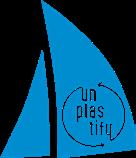





Dr. Guillermo Montenegro
On behalf of the city of Mar del Plata, I extend a warm and sincere welcome to all competitors, companions, coaches, team leaders, and authorities visiting for the Optimist World Championship this December.
It is a true honor to welcome young sailors from 52 countries and their families, representing diverse cultures and regions worldwide, who share a passion and determination for sailing. We are proud to host you and believe your visit presents a fantastic opportunity for all Mar del Plata residents.
Since our administration began, we have made a conscious decision to position Mar del Plata as a venue for

top-tier events. In 2024 alone, we have hosted the Premier Pádel, the 9th ITF Taekwondo World Cup, and now, the Optimist World Championship. This reflects Mar del Plata’s status as a worldclass destination and is part of an active policy aimed at boosting tourism, creating jobs, and enriching our community.
Our city was chosen not only for its natural beauty but also because sports experts recognize our regatta course as one of the best in the world. The Club
Náutico Mar del Plata has a proven track record of organizing such events. I trust that it will meet your expectations and that, beyond the competition, you’ll have the chance to explore all that Mar del Plata offers.
Fair winds to all! Enjoy the competition, the sea, and the warm hospitality of Mar del Plata. We are delighted to welcome you to our city and hope this is just the beginning of many visits.


Mr. Juan Agra
As President of the Club Náutico Mar del Plata, I want to extend a very warm welcome to all the competitors and companions visiting us for the 2024 Optimist World Championship. It is a true honor to host young sailors from 52 different countries who share the same passion and the same goal at our Club. We are sure that you will enjoy the competition in the demanding racecourses of Mar del Plata.


I also invite all attendees to get to know our beautiful city, which has just celebrated its 150th anniversary. The CNMP is on its way to its first centenary, and hosting the World Championship is a way to celebrate. I hope you have an unforgettable experience and return soon to our beloved Mar del Plata and our Club. Fair winds to all and enjoy the competition and your stay!


Mr. Kevin Whitcraft
On this occasion of the 2024 Optimist World Championship, hosted in Mar del Plata, Argentina, I extend a very warm welcome on behalf of IODA to all sailors, team representatives, coaches, and supporters.
This is the second time that Mar del Plata has hosted an Optimist World Championship (1992) and the third time for Argentina (Buenos Aires, 2014). We are very happy to be back to enjoy the warm hospitality and superb racing conditions.
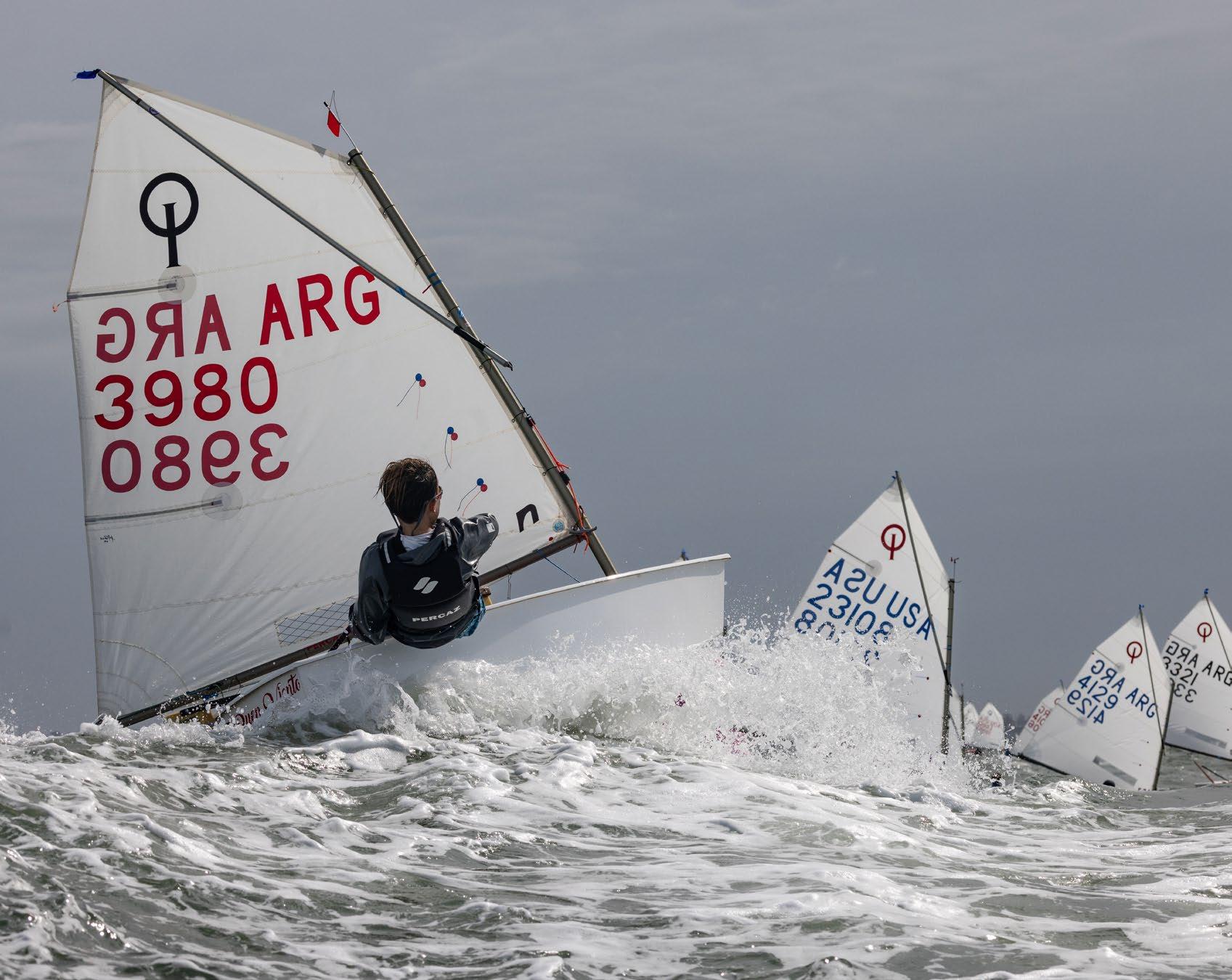
The best Optimist sailors from around the globe are uniting to compete in one of the world’s most challenging sailing courses. Local sailor Martin Jenkins achieved 2 Optimist World titles (1994, 1995) from training in these waters. Each IODA World’s Team has up to 5 sailors, both boys and/or girls, who have qualified their spot to represent their country by sailing in national Optimist regattas. This year with 227 competitors from 52 countries
participating, the 2024 Optimist World Championship is a truly global event showcasing the exceptional talents of these sailing athletes.
The Optimist dinghy continues to be the leading youth sailing boat on all continents and is the largest Class of World Sailing. At the recent 2024 Paris Olympics the statistics for the Optimist are quite astounding:
All of the Gold medals were won by sailors who had started their careers in the Optimist and had competed internationally.
15 out of the 18 medals were won by sailors who had raced internationally in the Optimist.
Incredibly, 7 of the medalists in Paris raced against each other in the 2008Optimist World Championship.
What a year 2008 was for Opti racers! I am confident that the Optimist sailors competing this year will excel similarly in sixteen years’ time. Just as important is to enjoy sailing for your lifetimes.
To organize an Optimist World Championship is no small undertaking and to be in Argentina this year has been a great achievement with much dedication toward creating a successful and memorable championship. I would like to sincerely thank the Organising Committee for their hard work, and the Club Náutico Mar del Plata for hosting the event, along with the Asociation Optimist Argentina. I also want to thank all the
Sponsors who have helped to make this event possible through their generous support. Finally, a big thank you to all of the volunteers both locally and internationally who have worked tirelessly to support the event and the sailors.
In conclusion to the sailors, I hope that you enjoy all that the championship and Mar del Plata have to offer, compete to the best of your abilities within the Racing Rules of Sailing make new friends, and most importantly stay safe.
Kevin Whitcraft President, IODA






Established on March 25, 1925, by three distinguished citizens —Teodoro Bronzini, Rufino Inda, and Eduardo Peralta Ramos— the Club Náutico Mar del Plata has a rich history intertwined with the city’s maritime heritage. Eduardo Peralta Ramos, grandson of Mar del Plata ‘s founder, served as the club’ s first president. The club’s primary objective was to foster a connection between the city ‘s residents and the sea.
On July 18, 1926, the club inaugurated a modest headquarters in the newly constructed port, initially focusing on rowing and later expanding to swimming. In 1934, the General Maritime Prefecture officially recognized the club as a Yacht Club, marking a significant milestone. The following year, the club launched its first sailboat, the
“Chingolo,” and organized its inaugural rowing and sailing regattas.
Rowing, the club’s founding sport, achieved its first national victory on October 12, 1937. This triumph was the precursor to numerous South American and World titles, including those won in Germany and Belgium in 1954.
To diversify its offerings, the club introduced tennis in March 1942, hosting its first internal championship. This sport flourished within the club, culminating in the emergence of its most celebrated athlete, Guillermo Vilas, a four-time Grand Slam champion and Argentina’s tennis icon.




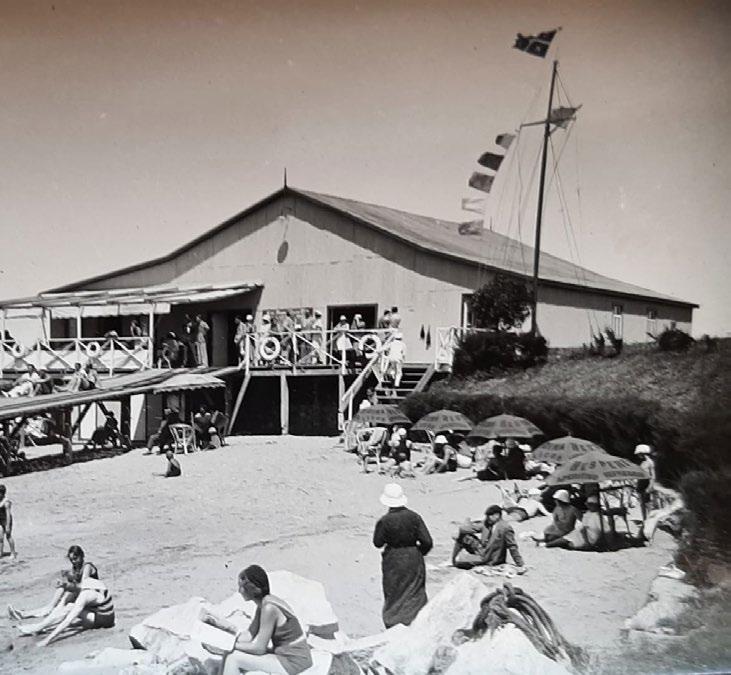




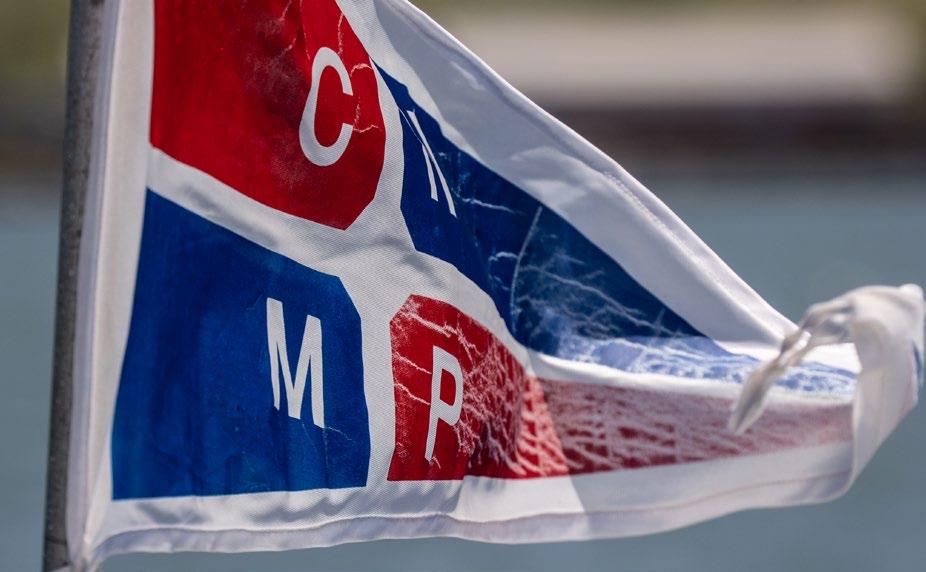

In 1942, the club joined the Argentine Federation of Racing Yachting, propelling the growth of sailing within the institution. This led to the establishment of the Nautical School in 1946 and the participation of the schooner “Lorna” in the Buenos Aires-Rio de Janeiro Regatta in 1950.
In 1966, the Argentine Federation of Racing Yachting designated the Club Náutico Mar del Plata as the headquarters for what would evolve into the International Yachting Week (Semana Internacional del Yachting). This prestigious event, now in its 60th year, attracts over 900 competitors annually from Argentina

and around the world in different kinds of dinghies and keelboats.
With approximately 4,000 members, the club boasts a vibrant social and multi-sport environment, offering a wide range of activities, including sailing, tennis, field hockey, roller hockey, Stand Up Paddle, paddle tennis, and swimming.
The club has demonstrated its organizational prowess by hosting numerous high-profile events, such as the Davis Cup, the 1995 Pan American Games, the 1992 Optimist World Championship, two South American Optimist
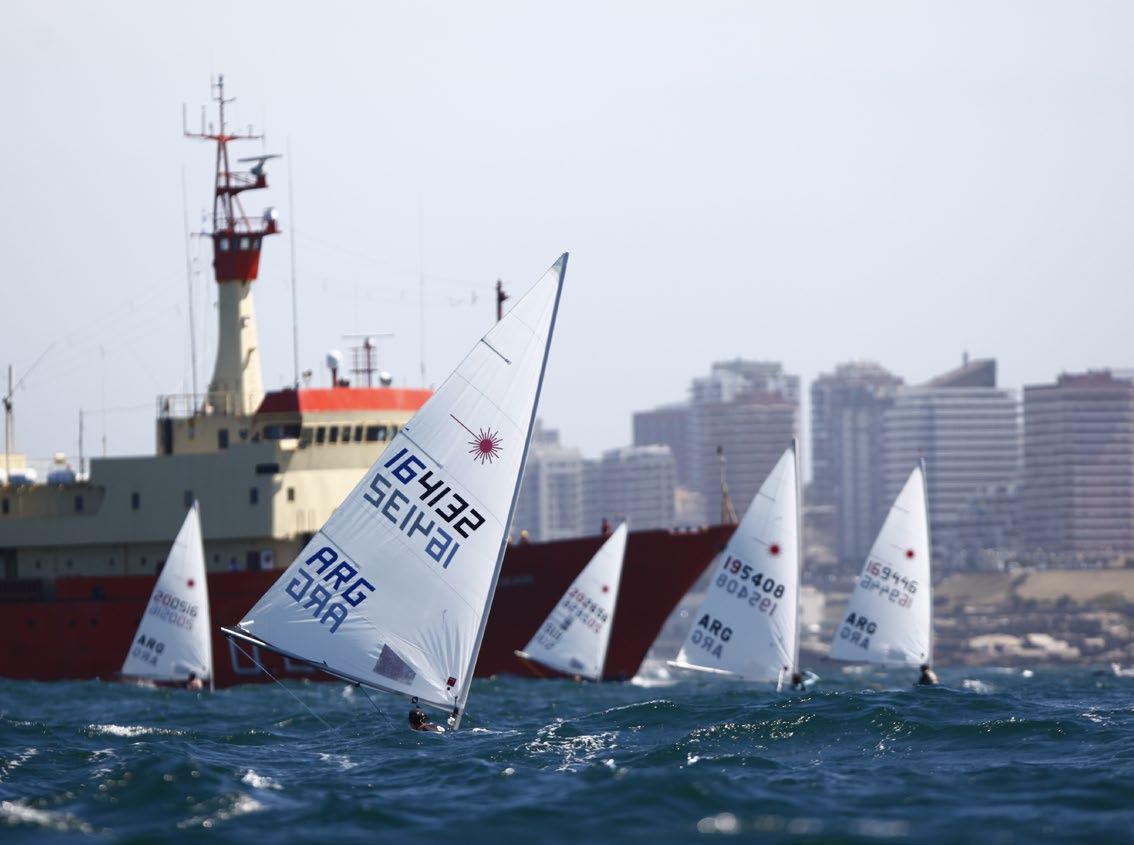
Championships, the Mistral Class World Championship, and the 2011 29er Class World Championship.
The club’s sailing school has produced numerous international champions. Notably, Martín Jenkins clinched two World Optimist titles in Italy (1994) and Finland (1995), while Francisco Van Avermaete and Andrés Grimaldi secured the World Cadet title in Australia (1995). Additionally, club members have excelled in top-tier sailing circuits like the TP52, Match Race

World Tour, J/24, and J70 World Championships. Maciel Cichetti, a prominent member, has amassed over 12 world championships, participated in three America’s Cups, and three round-theworld races.
As the Club Náutico Mar del Plata celebrates its 100th anniversary, it proudly hosts the World Optimist Class Championship once again. We extend a warm welcome to all participants and hope you enjoy our facilities and become part of this great family.

DECEMBER
THURSDAY 5
FRIDAY 6
SATURDAY 7
SUNDAY 8
MONDAY 9
TUESDAY 10
WEDNESDAY 11
THURSDAY 12
FRIDAY 13
SATURDAY 14
SUNDAY 15
ACTIVITY
Registration and Measurement.
Registration and Measurement.
Team Leaders’ meeting.
Opening Ceremony
Individual World Championship Races.
Individual World Championship Races.
Individual World Championship Races.
Team Race World Championship.
Team Race World Championship.
Individual World Championship Races.
Individual World Championship Races.
Individual World Championship Races.
Closing and Prize Giving Ceremony
Official Departure Day.
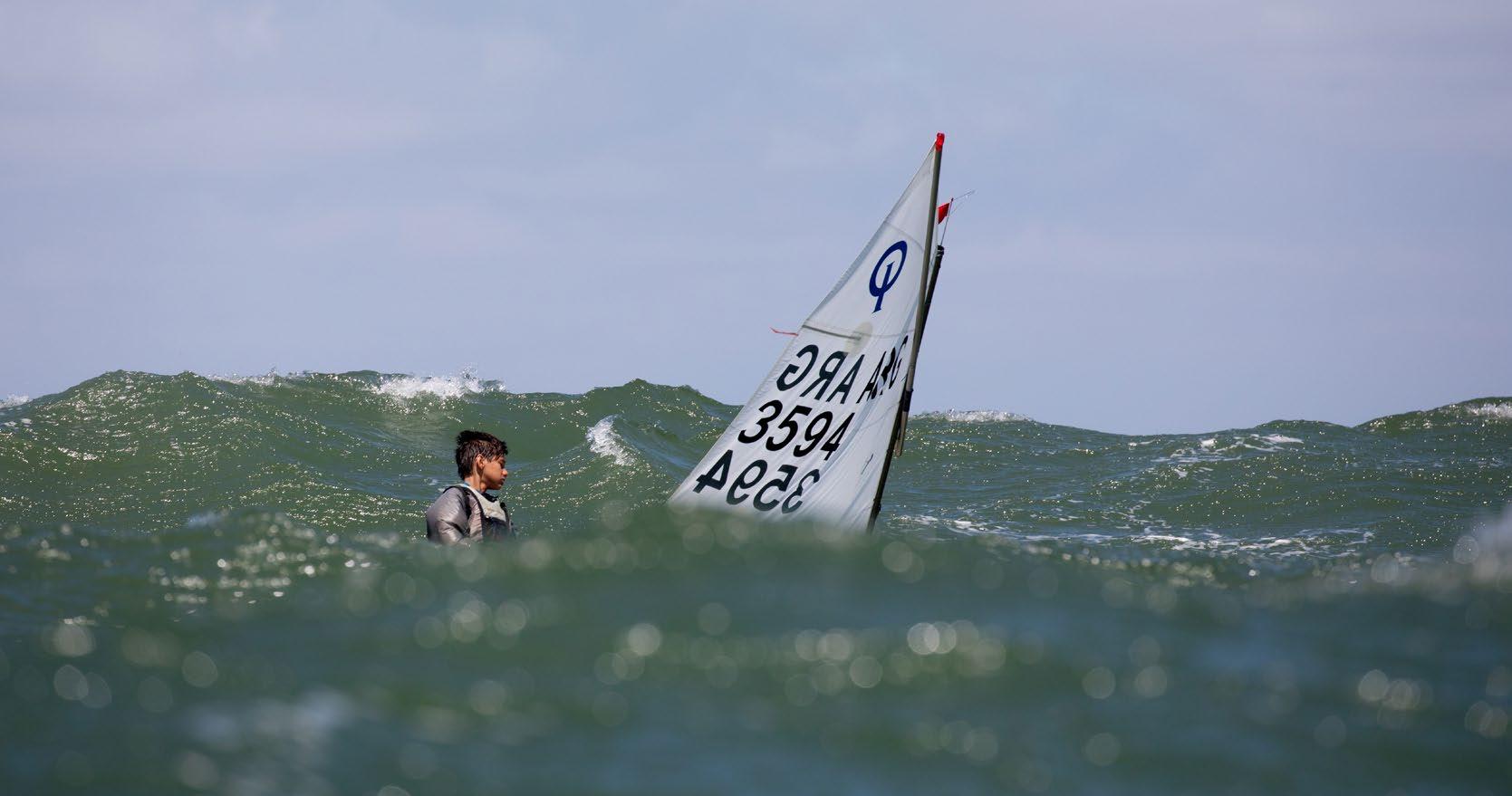


ARGENTINA
ARG 4125
ARG 4135
ARG 4165
ARG 4038
ARG 3966

AUSTRALIA
AUS 1877
AUS 1516
AUS 1882
AUS 1906
AUS 1782

AUSTRIA
AUT 2016
AUT 1199
LEONARDO NICOLAS
MAGNANI JULIANA
MOLINARI TOMAS
PROPERZI JUAN SEBASTIAN
VOGT LUCAS ANDRES
BUIVIDAS AUGUSTUS
DUTHIE MURRAY
HOWELL ZAC
PHILLIPS TOBY
TOMISHIMA GORO
BLASSNIG SOFIA MARIE
RHOMBERG FELIX
AUT 2030 SENGER-WEISS NICOLAUS ROLAND PAUL
AUT 767 VINAZZER LISA
AUT 2033 WAGNER KRIS


BAHAMAS
BAH 116 LARAMORE LORENZO
BAH 111
MCKINNEY-LAMBERT FINLEY
BAH 150 PRITCHARD CALLUM
BELGIUM
BEL 1195
BAERT KIRAN
BEL 1245 DE BIE MAUD
BEL 1255 LAGRANGE HENRI
BEL 1214
BEL 1252

BERMUDA
BER 80
MARIS REMY
TRUPPO VALERIO
AMARADASA NOAH
BER 87 DAVIS EVAN
BER 46 GOTFREDSEN NINA
BER 64 POWER LUIS MIGUEL
BER 62 SAVAGE RORY

BRAZIL
BRA 4334 BACK ARTHUR
BRA 4120 ESSINGER BACKHEUSER EDUARDO
BRA 4337 FREITAS JOANA
BRA 4360 SARTOR THEO
BRA 4282 SASAKI TANNOUS HENRIQUE

CANADA
CAN 1900 KEILMAN HAYDEN
CAN 1989 KEILTY WILL
CAN 1859 RAMSEY KAI
CAN 1878 THOMPSON SIMON
CAN 1899 TU JINGBO JACOB

CHILE
CHI 382 GIL OREILLY VICENTE
CHI 511 MACKENNA PEREZ-COTAPOS MANUEL
CHI 264 MELLADO OÑATE AGUSTIN
CHI 346 ROMAN FORTEZA BALTAZAR
CHI 381 UGARTE CORBO BENJAMIN

CHINA
CHN 7206
GONG YUKAI
CHN 7321 LI YUXUAN
CHN 9923 WAN FEIRAN
CHN 571 XU ZHENJIE
CHN 162 ZHANG RONGKAI
CROATIA
CRO 1325 BARIŠIĆ MARKO
CRO 1357 DUPLANČIĆ BEPO
CRO 1328 JAKIĆ ZORAN
CRO 1320 MARUŠIĆ NINA
CRO 1394 MOHAČ BORNA
CYPRUS
CZECH
REPUBLIC
DENMARK
CYP 46 LACONICO JUAN PABLO GARCIA
CZE 888 DYMAKOVA LILIANA
CZE 828 GRODL TOMAS
CZE 858 LEJHANCOVA EMILY
CZE 881 SKOREPOVA ANNA
CZE 884 ZAKOUCKY HYNEK
DEN 8756 BIRGERSSON CARL VINCENT
DEN 8789 HAVEMANN ERIK FUTTRUP
DEN 8762 HØJLAND JOHAN PEITERSEN
DEN 8790 MADSEN SYLVESTER BERG
DEN 8750 THRANE CARL WILLIAM BIRKE

ECUADOR
ECU 4 JONAS KOREIVA BORYSYUK
ECU 9 JOSE RICARDO ARCOS NUÑEZ
ECU 5 JUAN PABLO TOAPANTA
ESTONIA
EST 369 EBERLE ALEXANDER
EST 386 KANGUR ELLE MARIE
EST 384 KANGUR HELENA LEE
EST 321 MÜNT MARLON
EST 394 PUTNIK JACOB
FINLAND
FIN 1093 AMINOFF JONAS
FIN 1234 LATVALA LILY-SOFIE
FIN 1180 SELIÖ SISU
FIN 1249 SEPPONEN LAURI
FIN 1161 VIKMAN CAROLINE
FRA 3121
BELLES VALENTIN
FRA 3167 BRAND-GAZEAU TUGDUAL
FRA 2980
FRA 3113
GERMANY
GREAT BRITAIN
CHARPIN CLARA
KRAUSS MATHIAS
FRA 3179 PAPIN PHILIPPE
GER 1929 HICKSTEIN PAUL FIETE
GER 1729 LEMBECK TIZIAN
GER 1973 PORTHUN JASPER
GER 1902 SEEKAMP JONNY
GER 2002 TROEGER NICOLAS
GBR 6656
DRAPER HARRY
GBR 6632 EDWARDS ELIANA
GBR 6531 FLETCHER HUGO
GBR 6648 GOSLING LEO
GBR 6630 SHEPHERD PIPPA
GREECE
GRE 3184 MAKRI MARIA ANNA
GRE 3180 PANAGOPOULOS IASON
GRE 3181 SAMARAS STEFANOS
GRE 3182 SINANI KONSTANTINA
GRE 3183 THEODORAKOPOULOU DESPOINA

GUATEMALA
GUA 3 CRUZ MENENDEZ ANELIS DANIELA
GUA 6 GUZMAN VEGA MELANIE ROCIO
GUA 1 MOLINA ROLDAN OTTO ISAAC
HONG KONG
HKG 304
HENRIKSSON CHANTAL DELLA CONCHATA
HKG 506 KIU ETHAN LACHLAN
HKG 253 LIU ZIHAN
HKG 226 MALIAH TARA
HKG 228 YAM ALEXANDRA JILL
HUNGARY
HUN 1659
GEREBEN BARNABAS
HUN 1529 SIKLOSI LORANT
HUN 1656 TEGLAS DONAT
HUN 1663
VARGA MIHALY
HUN 1640 ZSIDAI ANASZTAZIA LEDA
IRLAND
IRL 1674
IRL 1663
IRL 1667
DONAGH MAEVE
DONAGH LILY
FEGAN PATRICK
IRL 1670 O’HARE MAX
US. VIRGIN ISLANDS
\ITALY
ISV 175 FOGARTY WYATT
ISV 146 HODGINS FINN
ISV 128 PEARSALL AVERY
ISV 117 USZENSKI REAGAN
ISV 187 ZIMMERMAN WILL
ITA 117 DEMURTAS ANDREA
ITA 9925 DI MARTINO MATTIA
ITA 9397 GEIGER TOMMASO
ITA 101 SCIALPI LEANDRO
ITA 9999 TRAMONTANO ANDREA
JAPAN
JPN 3400 GOTO HARUTO
JPN 3381 IWANAMI SHOGO
JPN 3153 NAGAHORI KOH
JPN 3286 SUNAGA KOTOHA
JPN 3355 TSUNOMORI MISAKI
LIBYA
MEXICO
LBA 101 EL WALID MOHAMED FAYEZ YOUSEF
MEX 1133 ACUÑA CARRION MIA
MEX 1082 AGUILAR TOPETE DIEGO
MEX 1070 CARRANZA HERNANDEZ VALENTINA
MEX 1186 CASAS MENDOZA ANDREA
MEX CARDOW OTIS
MALTA
MLT 158 AZZOPARDI ISAAC
MLT 163 CUTAJAR LIAM ANDREW
MLT 173 DECESARE TIMOTHY
MLT 230 MICELI DEMAJO SEBASTIAN
MLT 159 NAGRUDNAIA ALEKSANDRA
MONACO
NETHERLANDS
NORWAY
MON 22 RUBINELLI FACUNDO MARIA
NED 3444 DE RUITER TIES
NED 3477 HOEVENS MILAN
NED 3497 MELENS MAURITS
NED 3476 MULDER FELIX
NED 3498 VAN ROOIJ MAUD
NOR 4094 KOPPERUD SOL NOR 4114 OEHME VITA STORM NOR 4112 OPSTVEDT CASPER HUUN NOR 4115 ØSTVOLD MATS SILVA NOR 4116 WANG-REISSIG ERWIN
NEW ZEALAND
PANAMA
NZL 4808
NZL 4769
BARKER MATTEO
BATTEN BLAKE
NZL 4566 DUNCAN BLAKE
NZL 4812
FYFE WILL
NZL 4801 SOPER NATHAN
PAN 1 LOWY ION
PARAGUAY
PAR 16 NUÑEZ ELISA
PAR 5 VERA MARTINA
PERU
PER 374 ACEVEDO JOAQUIN
PER 372 BOLIVAR MUÑOZ EMILIO
PER 365 CADARSO KELLY LUCAS
PER 361 CARRILLO MALAGA SOFIA
PER 369 MOY STEFANO
PHILIPPINES
POLAND
PHI 1898 MAYOR DANIELA
POL 3657 JEDRZEJ GLUSZYK
POL 3487 ALEKSANDER SZCZEPARA
POL 2168
POL 4040
POL 3952
PORTUGAL
POR 2431
POR 2819
POR 2713
POR 2823
POR 2749
PUERTO RICO
SINGAPORE
MILOSZ CIECHANOWICZ
JULIA NAGORSKA
MAJA HARASIMOWICZ - KRYSZTOFIAK
BARCELOS JOAQUIM
COSTA VICENTE
QUARTIN FRANCISCO
REIS DIOGO
VITAL ALFONSO
PUR 81 CALZADILLA-ALLORA ISABELLA
PUR 89 MARRERO-CUEVAS DIEGO
PUR 77
MÉNDEZ-LARMINAUX INÉS
PUR 91 PÉREZ-HERMIDA VALERIA
PUR 86 RIVERA-FERNÁNDEZ JULIAN
SGP 121
CHIA ETHAN
SGP 142 KUM SEAN
SGP 4698
SGP 3146
LEE DESIREE
PEE TECK WOON
SGP 122 WAN ZEPH
SOUTH AFRICA
RSA 1452
MUKHEIBER ROSS
RSA 3145 SADLER SEAN
SLO 482
BUTINAR FILIP LUKA
SLO 490 SORTA LINA
SLO 427 VALJAVEC FILIP
SLO 438 PETAROS KRISTIAN
SLO 468 ČERNAC ŠKOFIČ LAN
SPAIN
ESP 3611
CARBONELL MATEO
ESP 3645 COLL AMALIA
ESP 3689
ESP 3640
ESP 3634
SWITZERLAND
SWEDEN
THAILAND
TURKEY
UNITED STATES
DOMINGO JOAN
MANSITO MARTA
MUGICA IKER
SUI 1973 HIRSCH EDWARD
SUI 2009 LIATARD LEWIN
SUI 1966 LOFTEROD EIVINN
SUI 2011 MULLER LENA
SUI 1984 ROSTI TENMA
SWE 4920 BALDOCK FROST CORNELIA
SWE 4907 DAHLBERG DIDRIK
SWE 4921 GAVELFÄLT FORSSÉN ALEXANDER
SWE 4910 NETTERLID OSKAR
SWE 4905 RAMM-ERICSON ADELE
THA 1253 JAROENPON PAILIN
THA 1936 KITCHANASIRI THANVISIT
THA 1935 KLAYSOMBOON PINCHANOK
THA 1289 PHRAMMANEE KARIT
THA 1771 ROSS ALEXANDER
TUR 1911 ÇAĞLAYAN TOPRAK
TUR 1283 ÇINAR ALP
TUR 1776
ERENDEMIR EREN KAAN
TUR 1464 GÜVENÇ ASAF KAAN
TUR 1124 ÖZTEKIN YAĞMUR
USA 216 DURLACH MARCUS
USA 236 LAGUTENKO LETICIA
USA 22684 MONTAGU ALEXANDER
USA 217 MUNOZ MONTES PABLO
USA 22810 ULMER ANNA
URUGUAY
URU 108
ARHANCET CARRIQUIRY CLARA
URU 67 FERRARI SILBERBERG MILO
URU 84 GIMENEZ LESCANO MANUEL
URU 118 ORTIZ BERTOLETTI MÁXIMO
URU 87 RAMIREZ MARTINEZ JULIAN








The two-time World Champion from Mar del Plata.
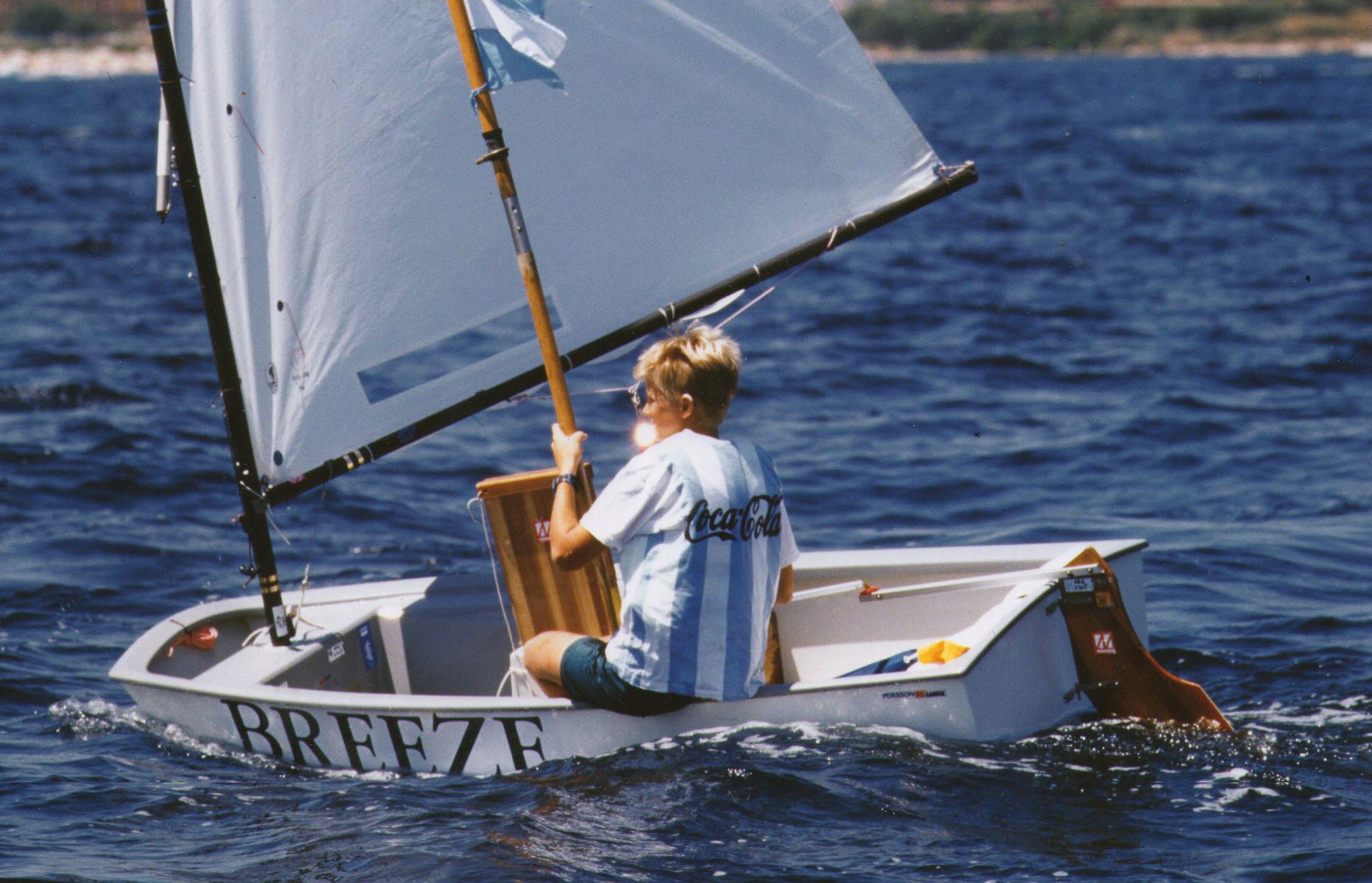
You were very young when the World Championship was held in Mar del Plata in 1992, but you did participate in the following three World Championships in 1993, 1994, and 1995. What was it like watching that 1992 World Championship as a spectator and what motivated you?
Yes, it was special even though I didn’t participate. I went to help to set up the course. I experienced what a world championship was. And I think it helped me to prepare myself for next year’s world trials.
What memories do you have of each of the World Championships you competed in?
The first things I remember of the world championships is having fun with the team and creating a friendship relation from other countries, kids that have a different culture but same sailing passion and compromise that we had. And of course, 30 years later I still remember some of the races, good ones and bad ones, and I’m surprised that I forget things I did yesterday but remember little situations from 30 years ago. I feel that I have to answer saying that to overcome these events with any holiday after it was very difficult.
Between 1990 and 1995, Argentina won 5 of the 6 World Championships held, and in 1994 the entire podium was Argentine. What do you think was the secret to achieving such hegemony for so long and why did it end?
I think the difference from the other countries was done by sailors older than me. Don’t really know what they did, maybe having the top 5 or 10 sailors from Argentina going to all the IODA events making them very good sailors and then at the national events all sailor from Argentina had the chance to sail with them, making to process to a
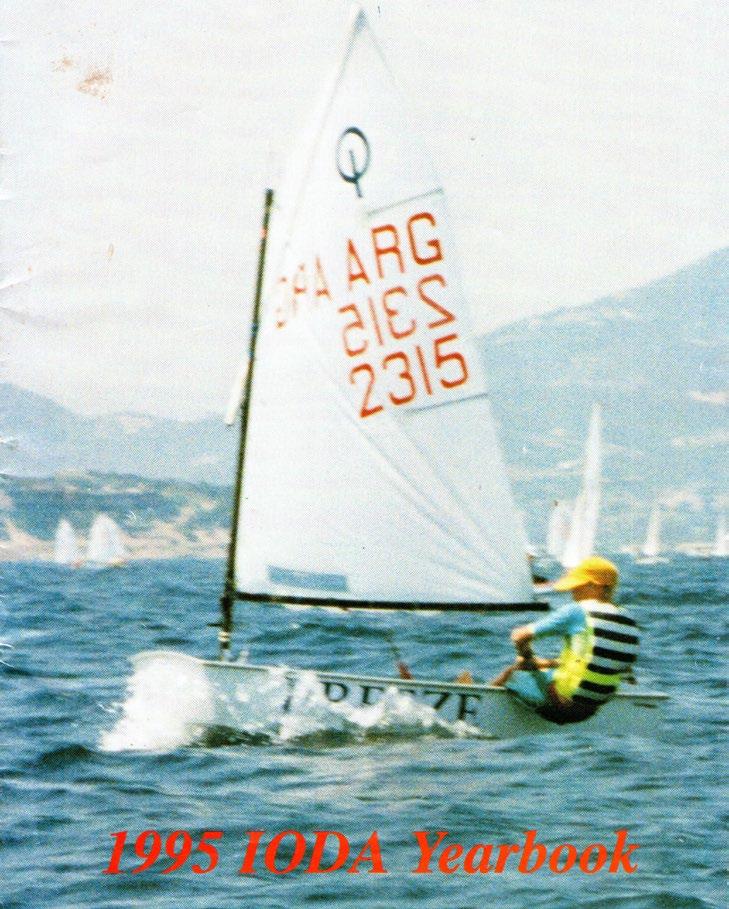
higher level, we felt sailing in a very high level at our first international event.
I was grateful for sailing during that period. Many countries thought we were sailing every day but we didn´t. When Argentina started to struggle to be in the top 10 at the worlds, many coaches were working in other countries and it started to become very expensive to travel, so when this happened it was not easy to bring the level up again.
You continued to be involved in the Optimist world as a coach for many years. How do you see the Optimist class, what things should change or improve?
When I was in the Optis, I was extremely competitive and dealt with some frustrations like we all did, but ended up achieving my goals. Now, being a father, I think what would’ve happened if I didn’t? I can’t imagine with 14 years old and with such pressure what could have happened. So my answer is, first prepare coaches to pressure the kids at the
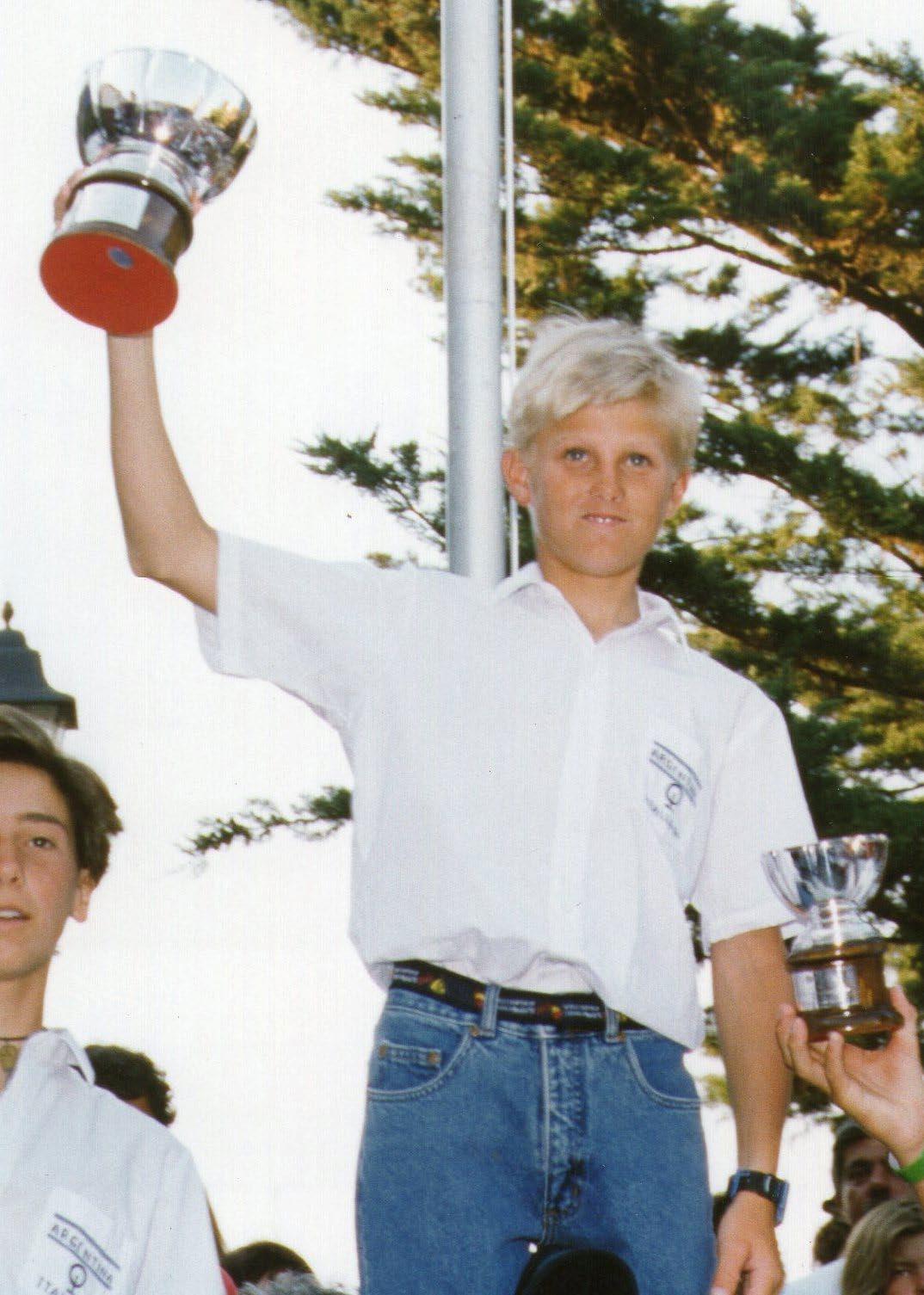
level the kid wants and not to the level the parent or the coach wants. Making sure if the goals are not reached, kids can deal with it, this can become a bigger problem in different aspects of the kids life. There are many ways of sailing and not all the kids choose the same one.
In 1992, the Optimist World Championship was held in Mar del Plata, and we believe that it was the first and only time that a competitor won all the races. It
was Ramón Oliden and that is why we remember him as the champion of zero points, because at that time in the Olympic scoring the first received 0 points.

Never in the history of the Optimist class has there been a world champion with such superiority over the rest of the fleet. What do you remember about that championship, and what do you think was your edge?
I remember that championship as an incredible experience, not just because of the results, but because of everything that led up to it. It was years of hard work, training in diverse conditions (rivers, lakes, seas) and with an excellent support team (the best coaches, home-
made boats, and many regattas). I think my edge at that time was the combination of discipline and passion. I had a clear focus on my goals, but I also enjoyed every time I went out on the water. Another important factor was my mentality. I wasn’t just competing against others, but against my own limits, and that helped me stay focused regardless of the circumstances. I was also lucky to continue a successful generation with good coaches and rivals.
You’re one of the most renowned coaches on the Olympic circuit. Can you tell us about the teams you’ve worked with?
Over the years, I’ve been fortunate to work with various teams, Olympic and non-Olympic, from different countries. Many of them have been or are worldclass, while others are developmental. I’ve built a comprehensive career, starting from the bottom with Optimist and ending up in the Olympic sphere. Each team brings its own dynamics and challenges, and adapting to different cultures requires learning to work in distinct ways.
What skills do you think are learned in Optimist sailing that will serve any Olympic or professional sailor for the rest of their life?
Optimist sailing is one of the best schools of life for a sailor. First, it teaches you to be self-sufficient: when you’re alone on the boat, everything depends on you. You also learn to adapt, as sea conditions change constantly, forcing you to stay alert and make quick decisions. Additionally, it instills respect for nature and fellow sailors. And I think resilience is crucial – learning to cope with defeat and understanding each competition as an opportunity to improve.
What advice would you give to the 250 participants competing in the Optimist World Championship in Mar del Plata?
I’d tell them to enjoy every moment. A world championship is a unique opportunity, not just to demonstrate what they’ve learned, but also to connect with sailors worldwide. My advice is not to obsess over results. Sailing combines technique, strategy, and mentality, so stay calm, trust your work, and enjoy the experience. Each regatta is a learning experience, and the true victory lies in the lesson learned, not just the podium.

What are your memories of the two World Championships you competed in, the one where you were runner-up in La Coruña and the one you won in Qingdao?
The first memory that comes to mind for the La Coruña Worlds was the team racing day. It was a very, very long day; we came back to the club at around 9 PM. We sailed all day since we had to do a fleet race in the morning and then the team race in the afternoon, so it was a huge, huge day, and I remember how late it was and how tired everyone was after the regatta. I also remember that in the semifinals against Croatia, one of our guys broke the sprit halyard, so we ended up racing three against four, but we still managed to beat them, which was a really good feeling. And the memory I have from the Qingdao World Championship was that there was very light breeze and there was a lot of current. I remember there was a race that I think I finished fourth, maybe a little better. I don’t remember exactly how I finished, but I do remember that only 10 boats finished because of the time limit. There was so much current that a lot of people couldn’t make it.
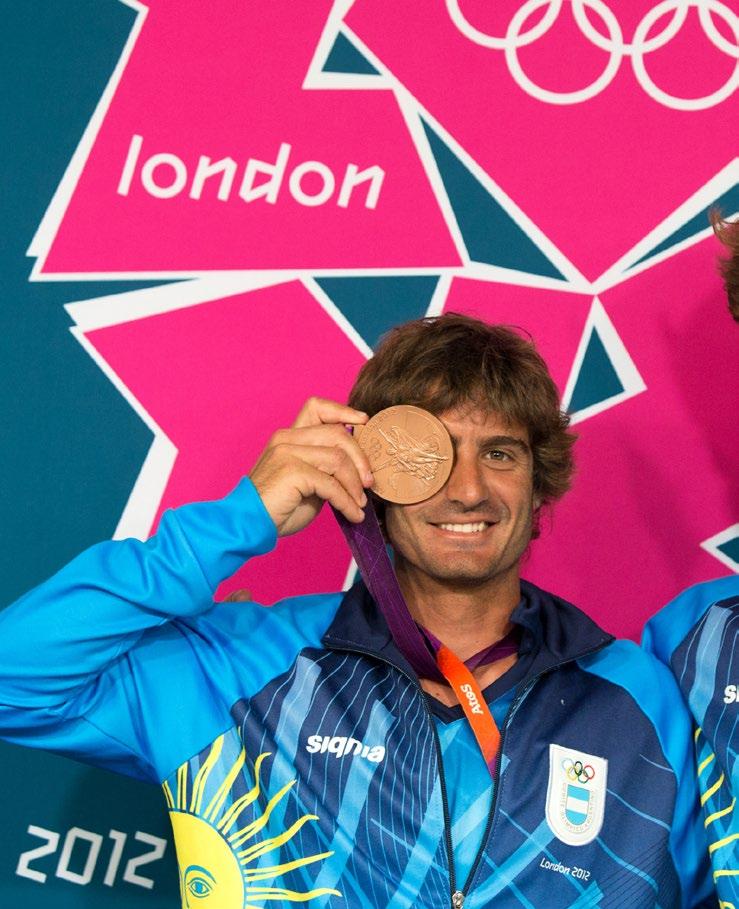
When I stopped sailing Optis, I didn’t really have all the resources needed for an Olympic campaign, so I started working a lot as a coach overseas and made a slow transition to the 420 and then after that to the 470. Once I was a little bit older in my 20s and I started going to Europe.

Did you continue to cross paths with some former Optimists in your Olympic campaign?
I remember seeing a lot of the guys that I used to race against in the Optimists, and yeah, it was a really good thing. I remember going to the Olympics with them, and I remember there were two main guys that I raced against in the Optimists: one of them won a gold medal in the 2016 Games (Sime Fantela), and another one was Anton Dhalberg, who I believe just won his second medal in the last Olympics in Marseille. So, yeah, I did keep sailing against them, and it’s a friendship that will last forever.
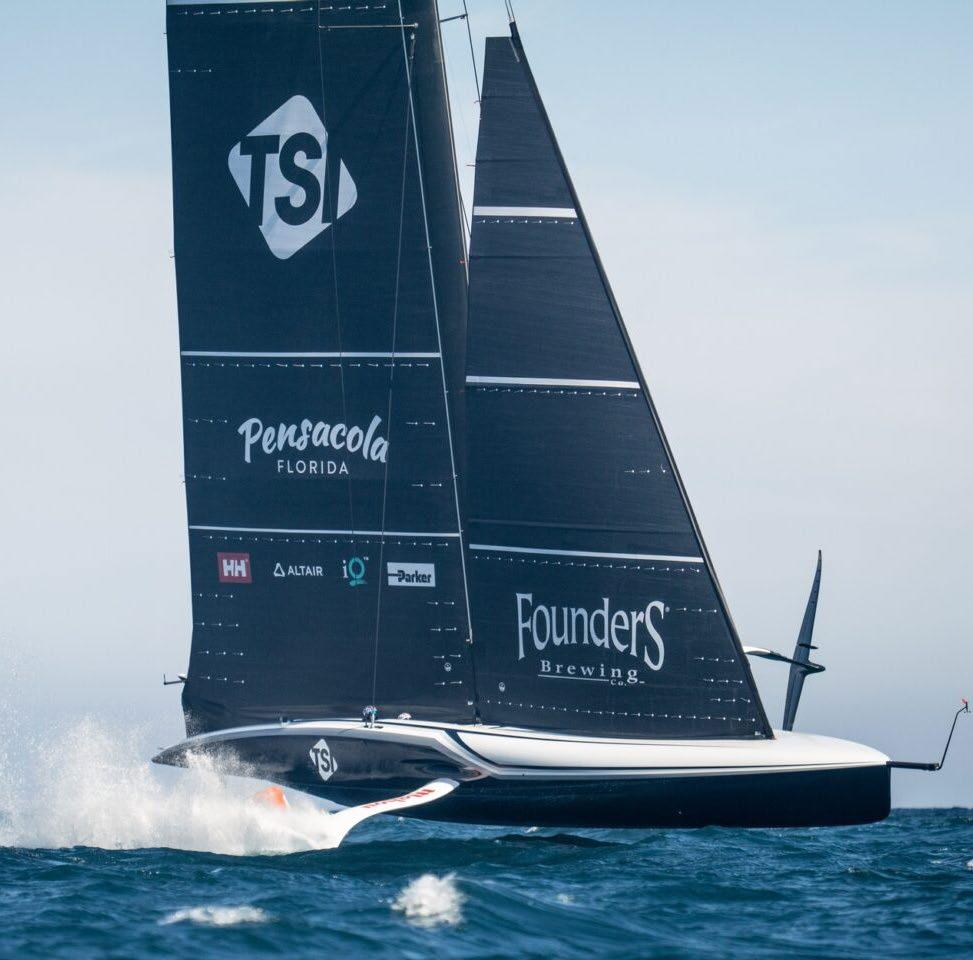
Steering an America’s Cup boat is the ultimate aspiration of any sailor. How did you feel when you took on that responsibility in the LV Cup semifinals with American Magic?
When I had to jump on the AC75 to steer at the Louis Vuitton Cup semifinals, it was bittersweet. On the one hand, it was sad because one of my teammates had been hurt, and that’s the reason I was sailing. On the other hand, it was a huge feeling of responsibility and
the desire to do it for my teammates. I wasn’t really too nervous about it since I felt prepared, not only for what I had done in the AC75 but mostly for all the years I’ve been sailing, especially starting in the early days with the Optimists and then the Olympic classes. It’s only professional sailing that I’ve done, even though I didn’t have that much time on the AC75, I still felt that I knew how to sail a boat, so it was a pretty nice feeling to be able to deliver a decent performance on my side.
it like to steer a foiling AC75 and what is your responsibility on the legs when you’re not steering?
Steering an AC75 is an incredible feeling. The amount of power the boat carries is huge, and at the end of the day, you see the boat the same way you see any boat: you just have to make sure you’re balanced and sailing at the best possible angle. Of course, there are challenges that are particular to the AC75, but everything I learned from the 470 and all the sailing I’ve done just applies almost the same way to this boat. It’s just that everything happens so much faster. That’s the biggest difference.
For the next challenges in my sailing career, I hope to continue in the America’s Cup arena. At the same time, I will do the Moth Worlds and try to get some dinghy sailing back in my schedule, and possibly some other professional sailing. I’m just trying to keep improving as a sailor with the same hunger I had when I was 12, 13, 14 years old, and I was racing the Optimist.
The only sailor to have won 3 Optimist world championships.
How old were you and how did you start sailing in Optimist?
I was 6 years old. I was on vacation in my father’s hometown on the Adriatic coast of Italy. There was a nice sailing club with a friendly group of children starting practise with Optimist
What was your first world championship, how did you finish and what memories do you have of it?
My first experience was in Villamoura, Portugal where I finished fourth (not bad). I have a funny memory: Italy shared the rubber dinghy with Spain, but we were forced to return to shore with Marcello Meringolo and me in the same Optimist!
It is rare for the same competitor to have competed in more than three world championships, but it is even more surprising to win three. What qualities do you think you had to stand out so much in the category?
I believe it was both the great passion but also my physical structure (at the age of 15 the boat could well accommodate me)
Do you have any special memories from each of the world championships you won?
Thailand was shocking and amazing maybe because it was the first one. Cyprus was much easier for me and I still keep the memory of sea turtles swimming alongside my boat. Antigua was the most difficult because of weather conditions and large masses of Posidonia plants. In this championship Italy won the team race for the first time after 18 years, so I was doubly happy especially for Norberto who has been waiting for this success for a long time.


You began a successful Olympic campaign in 470 and interrupted it to join the Luna Rossa America’s Cup team. How did that decision come about? Do you plan to return to the Olympics or how do you see your future in the world of sailing?
After some time, I understood that I could not afford both paths, despite the fact that I was allowed to do so by both the Italian Sailing Federation and Luna Rossa. I thought that the latter was a timely occasion that could have not come again, while 470 could wait for me.
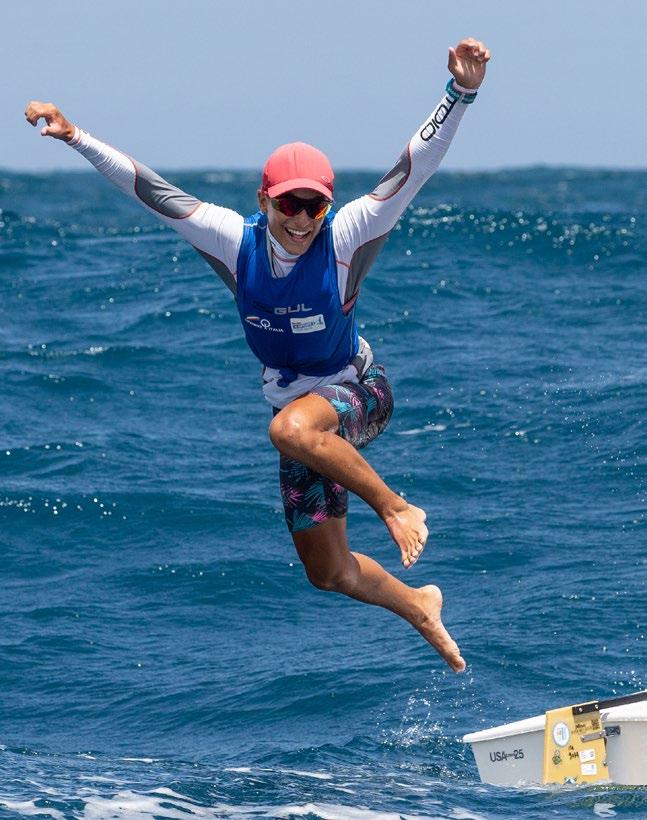
You have just won the Youth America’s Cup, first of all congratulations! Tell us how it was and what’s next in your future.
It has been a great experience, and I hope to be part of AC75 Luna Rossa team in the future.


By Pedro Daniel Mazza.*
Few coastal cities experience such a significant influence of changing wind patterns on other meteorological variables. Temperature, humidity, cloud cover, and more are all subject to these fluctuations. For instance, rapid development of significant weather phenomena, such as dense fog that can reduce visibility to just a few meters in minutes, sudden gusts of wind, abrupt temperature drops, or rapid changes in sea state, can all be attributed to the erratic behavior of the wind. All the air circulating around the planet is subject to the same basic causes. Trade winds, monsoons, and local winds like the Zonda, Pampero, and Sudestada, as well as various types of breezes, are all consequences of the same principle: differences in temperature. The greater the temperature difference between two points, the greater the difference in atmospheric pressure, and the stronger the resulting wind.
Whenever the gradient wind is not the predominant one, we can end up with a sea breeze or “virazón” scenario.The sea breeze in coastal cities like Mar del Plata, where it plays a significant role, follows the same logic: a differential heating that, at a certain point, becomes large enough to trigger the breeze. From late October onwards, the city can heat up rapidly, and December is the month when the temperature difference between the city, which easily reaches summer temperatures, and the marine area, which
takes much longer to warm up, is most pronounced.

The graph shows the monthly behavior of sea surface temperature off the coast of Mar del Plata throughout the year. The air over the continent can be twice as warm as the air over the sea surface. Between late November and December, we can easily find temperatures of 32-34°C over the city, compared to 16-18°C over the sea. This is enough to trigger a sea breeze, or “virazón,” whose intensity will be stronger the greater the temperature difference.
Therefore, we can conclude that the period between November and December is when the sea breeze is strongest, and it typically occurs around midday, after calm and hot mornings with a flat sea. A moderate to strong wind, reaching or exceeding 20 knots, can suddenly appear, often perpendicular to the coast or slightly
deviated to the left. Immediately, the temperature drops from around 30°C to 20°C, the sea becomes choppy, and as the sun sets, the wind diminishes, and calm returns.
This graph shows the statistical behavior of the wind throughout the year. While the prevailing wind direction is from the northeast, the strongest winds tend to come from the southwest. The northerly component, varying between northeast and northwest, is the most frequent, but the range of moderate to strong winds (3050 km/h) predominantly comes from the southwest.


Cyclogenesis: The birth of an extratropical cyclone from a frontal wave.
Slow evolution
Many prior indications
Enough time to take precautions
Instability Lines: Electric storms of varying intensity that organize in a line. In most cases, they advance ahead of cold fronts.
Very dangerous due to the generation of large areas of strong gusts. Sometimes confused with a cold front, leading to the mistaken belief that the weather is improving, but the cold front follows, generating a new in stability process and giving way to the leading edge of a high-pressure cell (often a Pampero).
Detected through careful analysis of satellite images and radar data.
Cold Fronts: A large percentage of the meteorological changes observed in the Mar del Plata navigation area are generated by these frontal systems.
Not all are intense. However, some that pass through in summer can also generate storms, whose severity will depend on the air masses involved and the degree of instability in the atmosphere’s vertical structure. Beyond the instability processes associated with the passage of a cold front, the wind shifts to the west-southwest, southwest, or south, and for several hours reaches moderate to strong intensity or more. This will de pend on the differences in temperature and humidity on either side of the front.
Detected well in advance.
It is relatively easy to calculate the timing of the frontal system’s passage.
In this photo you can see a barely rippled sea, while on the left, over the port and over the southern neighborhoods of mar del plata, this cloudiness is literally falling away.

Sometimes develop within high-pressure centers. Have very rapid evolution. They can form and develop in less than an hour. They may not appear dangerous on satellite images but deserve caution.
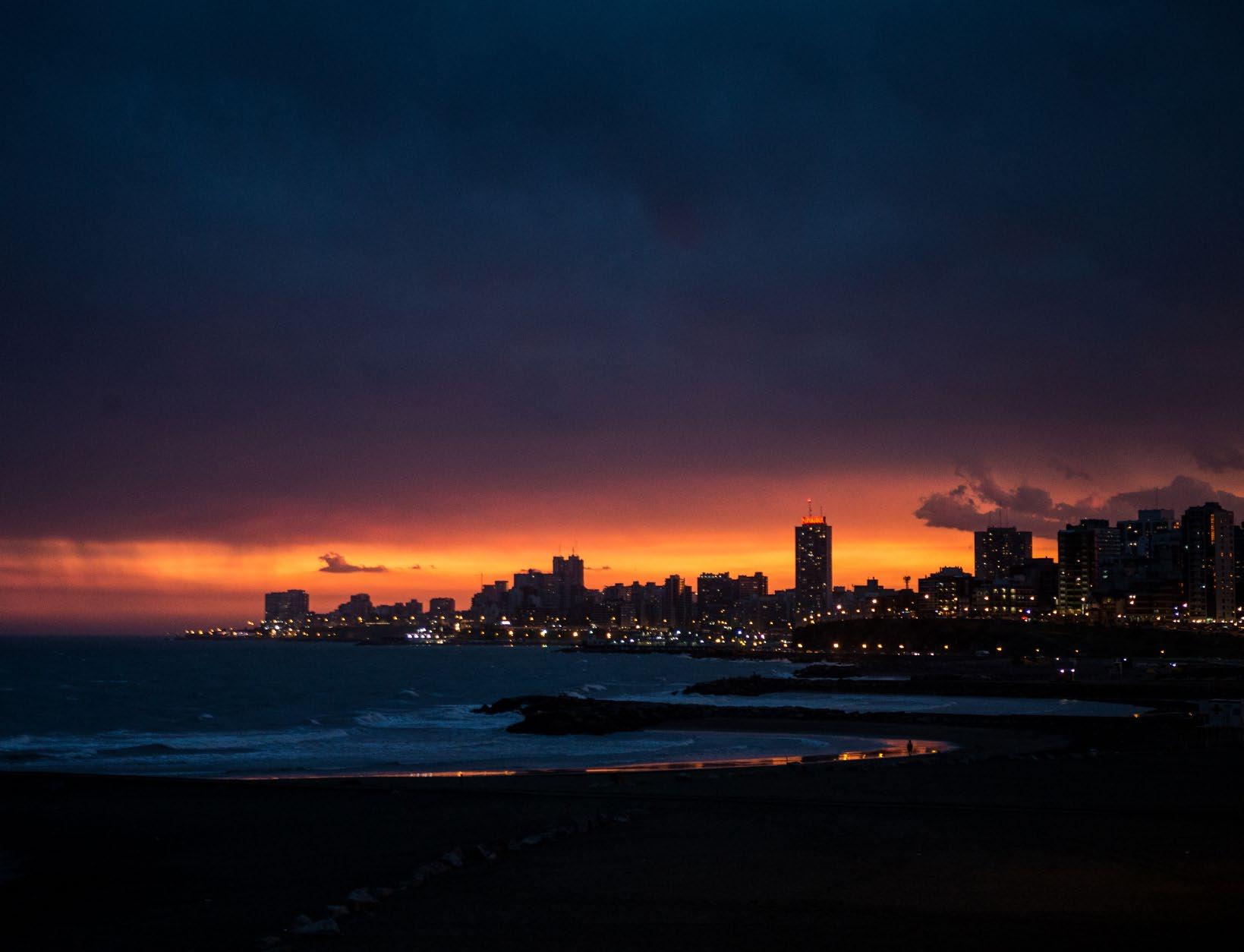
A mistake in forecasting is always a possibility. Therefore, it is essential not only to rely on available technology but also to remember the origins of this science, when cloud cover, wind, barometric pressure, and sea state “spoke to us.” This “language” is an inseparable part of maritime tradition and must be preserved and transmitted.
* Pedro Daniel Mazza is a local meteorologist and communicator, a technician in oceanic and aeronautical meteorology, graduated from the Naval University Institute of the Navy. Pedro will be hired by the organization of the World Championship, providing his meteorological forecasts.


“This photo was taken in Mar del Plata during the 2008 SIY and has become an iconic image that captures the positive spirit of teaching children to sail, reflecting the values of resilience, discipline, and the deep connection with the forces of nature that this sport fosters in young people.”

You’ve already seen our meteorologist’s official report, but now we’re going to give you some specific tips from an anonymous sailor. We don’t know if he is choosing to remain anonymous to avoid criticism from the Argentine team for sharing confidential information or if he is just spouting nonsense. In any case, at the end of the championship, you’ll be able to tell if these tips were helpful.
Mar del Plata racecourse has been recognized worldwide for being fair and highly variable. It’s possible to experience completely different and unpredictable weather conditions in the same week, making the races more exciting because “local knowledge” isn’t as important. Despite this, there are some typical situations we can highlight.
Seabreeze “Virazón”. Mar del Plata’s typical seabreeze is called “virazón”
and can reach up to 25 knots from the northeast. This wind is predominant during the summer months, but can also occur in December. With the seabreeze well established and the tide going out, it intensifies and the left side of the course may be slightly favored due to the weaker current near the coast and the Coriolis effect. Tip: “Enjoy this condition, it’s the best for racing and surfing waves.”
Northwest Gradient Wind. This is the most predominant wind in the area. It’s very interesting when this gradient wind battles the incoming seabreeze. On a typical summer day with the usual high-pressure center over this area, the day begins with a northwest wind that rotates to the northeast around midday to make way for the seabreeze. But if the northwest gradient wind is strong, it can delay the arrival of the seabreeze and favor the left side of the course, but
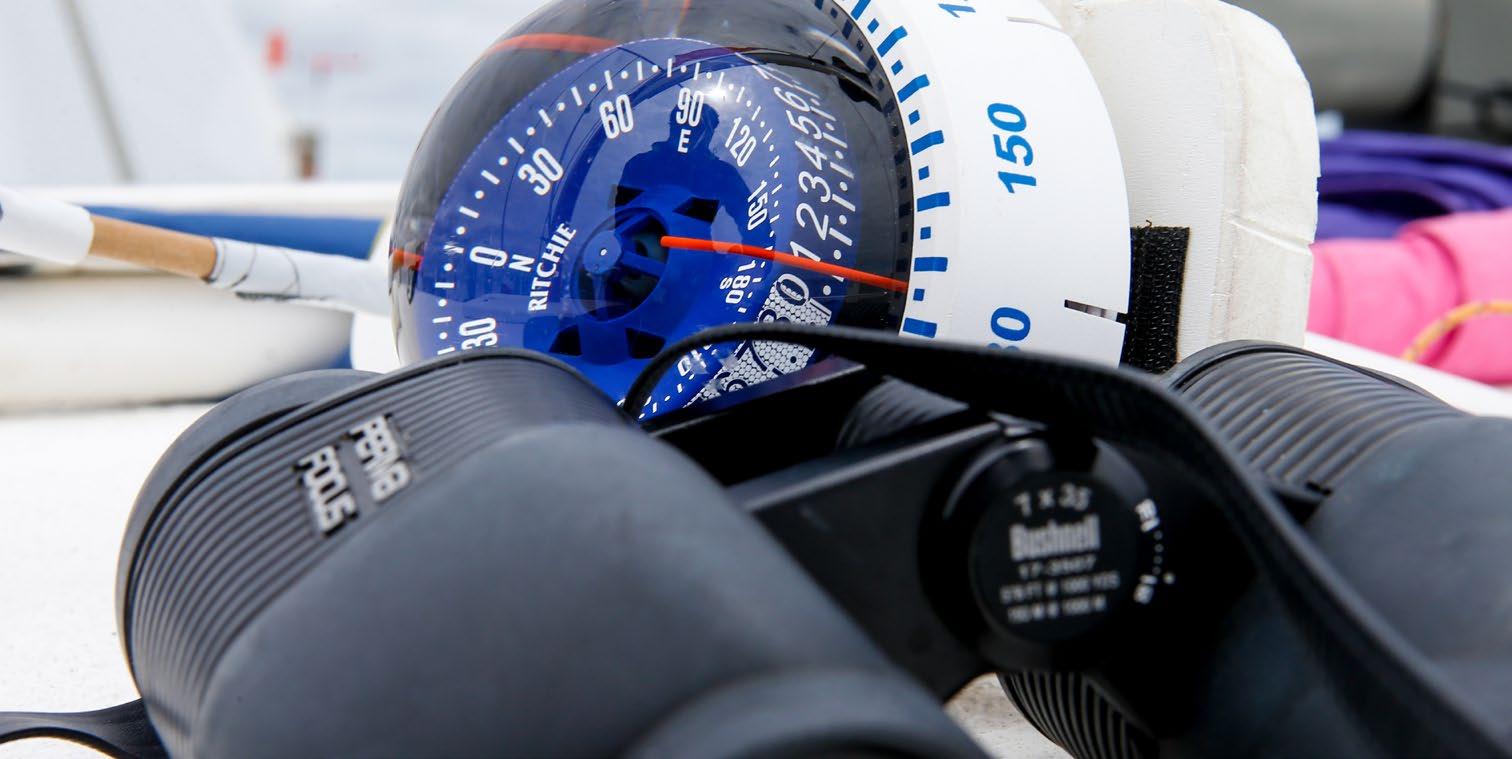
the right side should never be neglected in case the virazón arrives. Tip: pay close attention to the temperature of the gusts; if they remain warm, the land wind continues, but when they start to cool and the sea becomes rippled from the east, it’s clear that the big shift to the right will come.
South or Southwest Wind. The passage of a cold front can leave one or two days of winds from the southern quadrant. Again, it’s very important to see what’s happening with the current in these conditions. If the tide is rising, the south wind will increase it, just as the northeast wind increases the ebb. Therefore, with winds from the southwest quadrant and a rising tide, the right side of the course should be
watched because the shallower water near the coast means the current is slightly weaker. Tip: dress warmly, as the south wind has a polar component and can significantly lower the temperature, even in the middle of summer.
West Wind. This wind comes from the land and will therefore be affected by the buildings on the Mar del Plata coast. Although the racecourse will be located offshore and far from the coast, there may always be some disturbance. Be aware of shifts and lulls, but as a general rule, the locals have a saying: “Land wind, shore side.” Tip: don’t go crazy with the tacks, the wind comes and goes.

Dra. Gisela Giardino

In Mar del Plata, there’s a group of South American sea lions, scientifically named as Otaria flavescens. These pinnipeds are large, with males reaching up to 350 kg in weight. Adult males are distinguished by a mane around their neck, giving them the name “sea lion”. Did you know that the sea lions of Mar del Plata were there before the city itself? Early travelers who passed
through the area, like Drake, reported large numbers of pinnipeds (sea lions and seals) on each rocky outcrop along the coast, such as Cabo Corrientes, Puente Iglesias, Waikiki, and even Punta Mogotes. However, as the city developed, these colonies gradually disappeared from north to south until, in the 1960s, sea lions recolonized Mar del Plata, establishing themselves on the breakwater of the Club Náutico a convenient spot, thanks to discarded fish that provide easy food in the harbor.


The South American sea lion eats coastal fish, rays, and squid. Since their return, this haulout is exclusively composed of males of all ages, primarily juveniles and subadults. During the breeding season (JanuaryFebruary), these males travel to breeding colonies in Patagonia and Uruguay, while the females stay there to nurse their pups for a year. In these colonies, males fight to form and maintain a harem and do not feed during this
period. For this reason, when they return in February and March, they often look thinner and have some injuries.
Today, there is an average of 500 sea lions observable between the port, the naval base, and the Club Náutico, but based on mark-recapture methods, it’s estimated that the stable population is at least three times larger than what can be counted directly.
If you want to learn more, visit www.travesiasdelobos.blogspot.com
Dra Gisela Giardino
Docente e investigadora de la UNMdP y CONICET
Grupo de Investigación Biología, Ecología y Conservación de Mamíferos Marinos
Universidad Nacional de Mar del Plata (UNMdP) -IIMyC (CONICET)
Deán Funes 3350, (7600) Mar del Plata, Argentina.
Tel: +54 223 4752426 (int. 244)
Casilla de Correo 1260-Correo Central-MdP https://linktr.ee/becmm


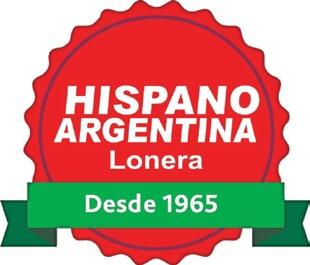




Av Jara 762 223 589-73 11
Av Edison 2960 223 439-2011
BALCARCE:
Av San Mar tín 3174 223 438-4018
guidotti construcciones
guidotti construcciones



Todo en placas, construcción en seco, y más. Asesoría - Corte - Pegado de cantos - Acopio Ventas online: 223-5903118. Juan B Justo 4153, Mar del Plata.

Dirección: San Juan 253 Tel comercial (223) 609 3069 construcciones.ods@gmail.com @ods.construcciones

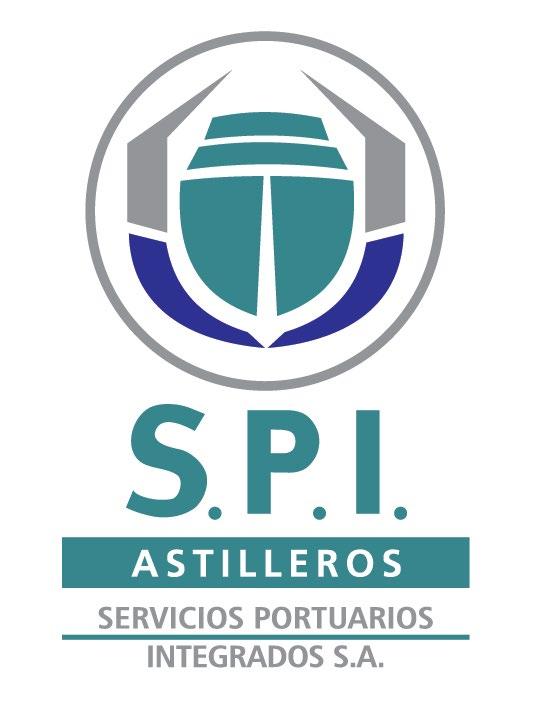

Av. Constitución 7598
Leandro N. Alem 3777
Alvarado & Bartolomé Mitre
Av. Constitución 4793
Rivadavia & Diagonal Pueyrredón
Güemes & Castelli
Avenida Juan B. Justo & Córdoba
Avenida Pedro Luro & David Ortega
Av. de los Trabajadores & Sicilia
San Martin 2455




1962 - 2023
Year Venue N.C.
Nat. Top three sailors
2023 ESP 54 SWE
First girl
Henric Wigforss Blanca Ferrando
USA Travis Greenberg
USA Wylder Smith
2022 TUR 61 THA Weka Bhanubandh Medine Havva Tatlican
USA James Pine
ITA Francesco Carrieri
2021 ITA 58 BRA Alex di Francesco Kuhl Lomane Valade
USA Gil Hackel
ITA Alex Demurtas
2019 ANT 65 ITA
Marco Gradoni María Perelló
MLT Richard Schultheis
ESP Jaime Ayarza
2018 CYP 58 ITA
Marco Gradoni María Perelló
USA Stephan Baker
THA Panwa Boonnak
2017 THA 62 ITA
Marco Gradoni María Perelló
MAS Muhammad Fauzi
CRC Mic Mohr
2016 POR 59 SUI
Max Wallenberg Victoria Schultheis
NOR Mathias Berthet
MAS Muhammad Fauzi
2015 POL 58 SLO Rok Verderber Jodie Lai
SGP Jodie Lai
NOR Mathias Berthet
2014 ARG 48 SUI
Nicolas Rolaz Aína Colom
THA Voravong Rachrattanaruk
GRE Dimitris Papadimitriou
2013 ITA 58 SGP Loh Jia Yi Bertha Han
GER Nils Sternbeck
SGP Edward Tan
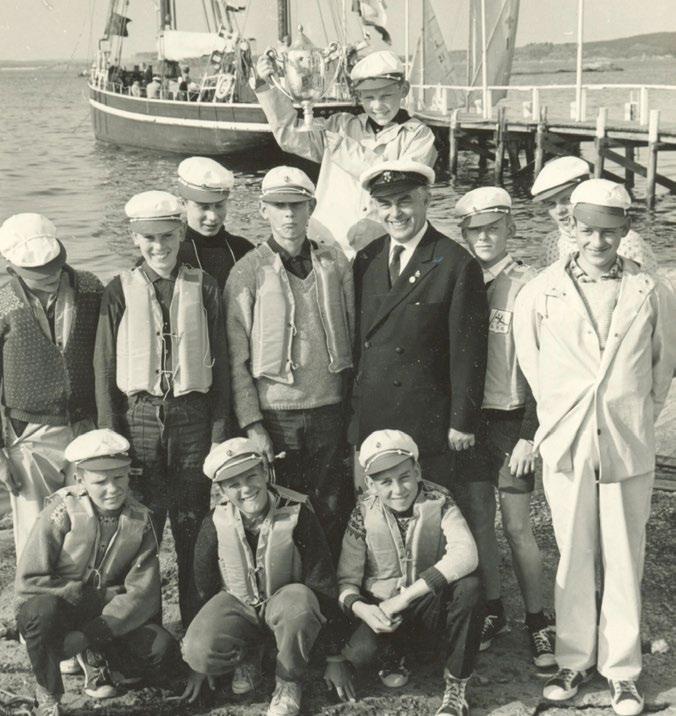

Year Venue N.C. Nat. Top three sailors First girl
2012 DOM 47 SGP Elisa Yokoyama Elisa Yokoyama
SGP Samuel Neo
SGP Jessica Goh
2011 NZL 48 SGP Kimberly Lim Kimberly Lim
NED Bart Lambriex
PER Javier Arribas
2010 MAS 53 THA Noppakao Poonpat Noppakao Poonpat
MAS Ahmad Syukri B.A.Z. JPN Okada Keiju
2009 BRA 47 PER Sinclair Jones Noppakao Poonpat
MAS Mohamad Faizal Norizan ARG Ignacio Rogala
2008 TUR 53 PUR Raúl Ríos Tomoyo Wakabayashi
ISV Ian Barrows
DEN Kristien Kirketerp
2007 ITA 55 NZL Chris Steele Alexandra Maloney
CHI Benjamin Grez
NZL Alexandra Maloney
2006 URU 50 GER Julian Autenrieth Griselda Khng
SGP Griselda Khng
ECU Edgar Diminich
Year Venue N.C.
2005 SUI 52 GER Tina Lutz Tina Lutz
TRI Matthew Schoener Scott
CHN Wu Jianan
2004 ECU 51 CHN Wei Ni Tina Lutz
NZL Paul Snow-Hansen
ESP Eugenio Diaz
2003 ESP 50 CRO Filip Matika Hannah Mills
BER Jesse Kirkland
ARG Sebastian Peri Brusa
2002 USA 46 CRO Filip Matika Xu Lijia
CRO Stjepan Cesic
ESP Eduardo Zalvide
2001 CHN 44 ARG Lucas Calabrese Xu Lijia
CHN Zhu Ye
MAS Abdul Rahim
2000 ESP 59 CRO Sime Fantela Stephanie Brulon
ARG Lucas Calabrese
ITA Jaro Furlani
1999 FRA 47 ITA Mattia Pressich Roberta Borges
CRO Tonci Stipanovic
POR Mario Coutinho
1998 POR 44 ITA Mattia Pressich Tina Celigoj
ARG Fernando Gwozdz
CRO Sime Fantela
1997 IRL 41 ITA Luca Bursic Siren Soot Sundby
ARG Matias Buhler
PER Nicholas Raygada
1996 RSA 39 NED Lisa Westerhof Lisa Westerhof
CRO Aron Lolic
ITA Ivan Bertaglia
1995 FIN 41 ARG Martin Jenkins Lisa Westerhof
BRA Frederico Rizzo
CRO Dario Kliba
1994 ITA 39 ARG Martin Jenkins Johanna Saerna
ARG Federico Perez
ARG Julio Alsogaray
1993 ESP 41 NED Mats Hellman Claudia Tosi
ARG Esteban Rocha
ITA Claudia Tosi
1992 ARG 29 ARG Ramon Oliden Claudia Tosi
ESP Marc Patiño
GER Mike Keser


1991 GRE 39 ARG Agustin Krevisky Gaia LuSGPi
ARG Asdrubal Garcia
DEN Andre Sorensen
1990 POR 38 ARG Martin di Pinto Natalie Gunst
ARG Agustin Krevisky
SEW Martin Strandberg
1989 JPN 30 DEN Peder Rönnholt Suzanne Ward
FIN Rami Koskinen
ARG Herman Rosso
1988 FRA 32 ITA Ugo Vanello Maria Mylona
ESP Luis Martinez Doreste
ESP Gabriel Tarrasa
1987 NED 29 ITA Sabrina Landi Sabrina Landi
ESP Luis Martinez Doreste
SWE Anders Jonsson
Year Venue N.C. Nat. Top three sailors
1986 ESP 29 ESP Xavier Garcia Isobel Hens
ESP Luis Martinez Doreste
FIN Risto Tapper
1985 FIN 32 NED Serge Kats Nuria Bover
FIN Risto Tapper
ARG Martin Castrillo
1984 CAN 28 NED Serge Kats Veronique Ravet
FIN Jussi Wikström
ESP Xavier Garcia
1983 BRA 22 ESP Jordi Calafat
ESP Jose Carlos Frau
FRA
Jean-Pierre Becquet
1982 ITA 26 NOR Njaal Sletten
DEN Christian Rasmussen
DEN Soren Ebdrup
1981 IRL 24 ARG
Guido Tavelli
SWE Johan Petterson
BRA Edson M Araujo
1980 POR 24 SWE
Johan Petterson
ESP Silvia Depares
DEN Rasmus Damsgaard
FIN Marko Heiskanen
1979 THA 16 SWE
Johan Petterson
ESP Silvia Depares
FIN Marko Heiskanen
DEN Rasmus Storgaard
1978 FRA 25 SWE
Rickard Hammarvid
FIN Peter von Koskull
SWE
1977 YUG 22 SWE
Patrik Mark
Patrik Mark
DEN Mads Damsgaard
DEN Poul Evers
Florence Rigolot
Florence Rigolot
Denise Lyttle
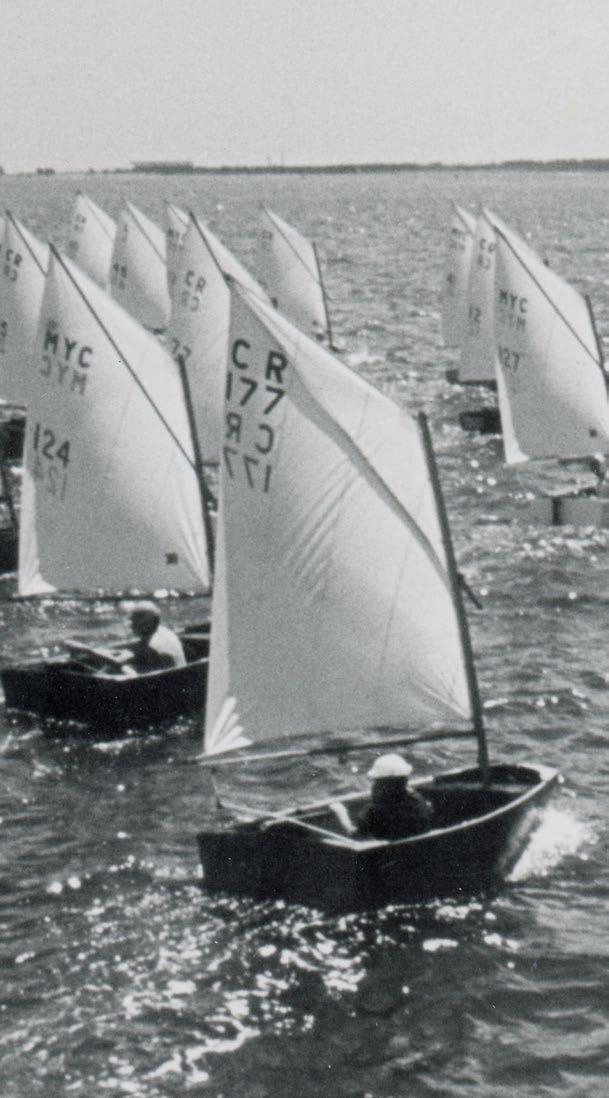
1976 TUR 19 SWE Hans Wallen
DEN Jens Asbjørn Hansen
USA Allen Lindsey
1975 DEN 23 DEN Hans Fester
SWE Mattias Söderström
SWE Martin Schröder
1974 SUI 20 ARG Martin Billoch
SWE Hans Wallen
DEN Hans Fester
1972 SWE 15 ESP Tomás Estela
SWE Martin Palsson
SWE Don Nordquist
1971 GER 13 FIN Heikki Vahtera

1970 ESP 14 USA James Larimore Nina Koepke
SWE Lennart Roos
SWE Ake Hansson
1969 GBR 12 USA Doug Bull Claudia Stokes
1968 FRA 16 DEN Peter Warrer Claudia Stokes
DEN Henrik Söderlund
USA Doug Bull
1967 AUT 10 DEN Peter Warrer
1966 USA 6 USA Doug Bull
1965 FIN 9 SWE Ray Larsson
1964 DEN 7 DEN Poul Andersen
1963 SWE 5 SWE B Baysen
1962 GBR 3 SWE Anders Quiding
INFO: Robert Wilkes https://wilkessail.net/ Photos: IODA Archive.






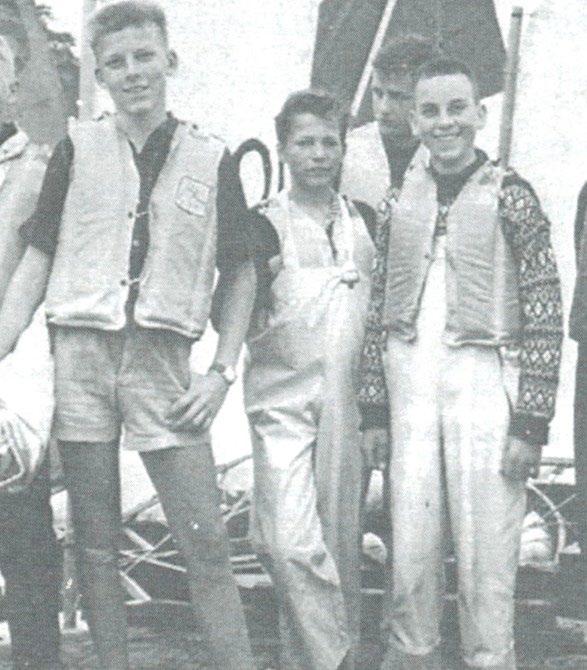

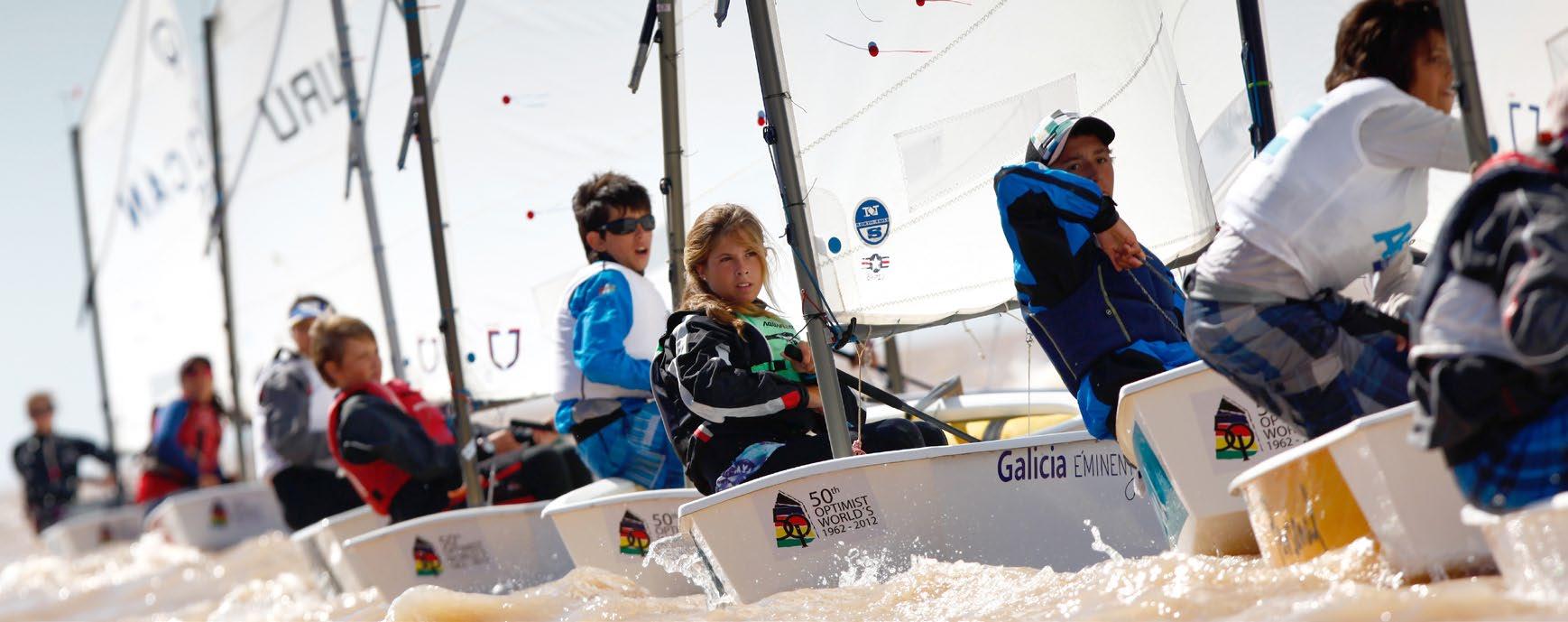
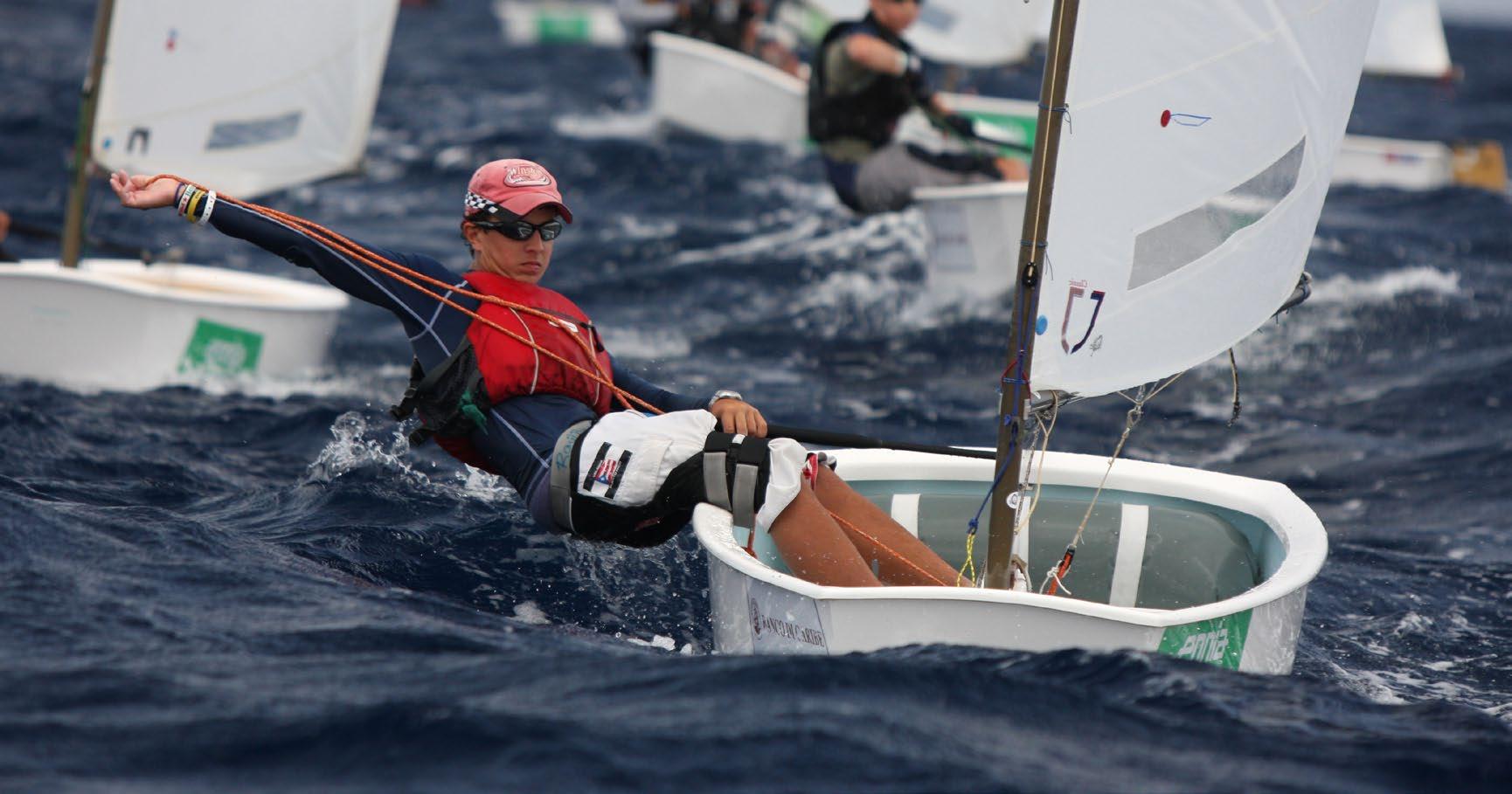


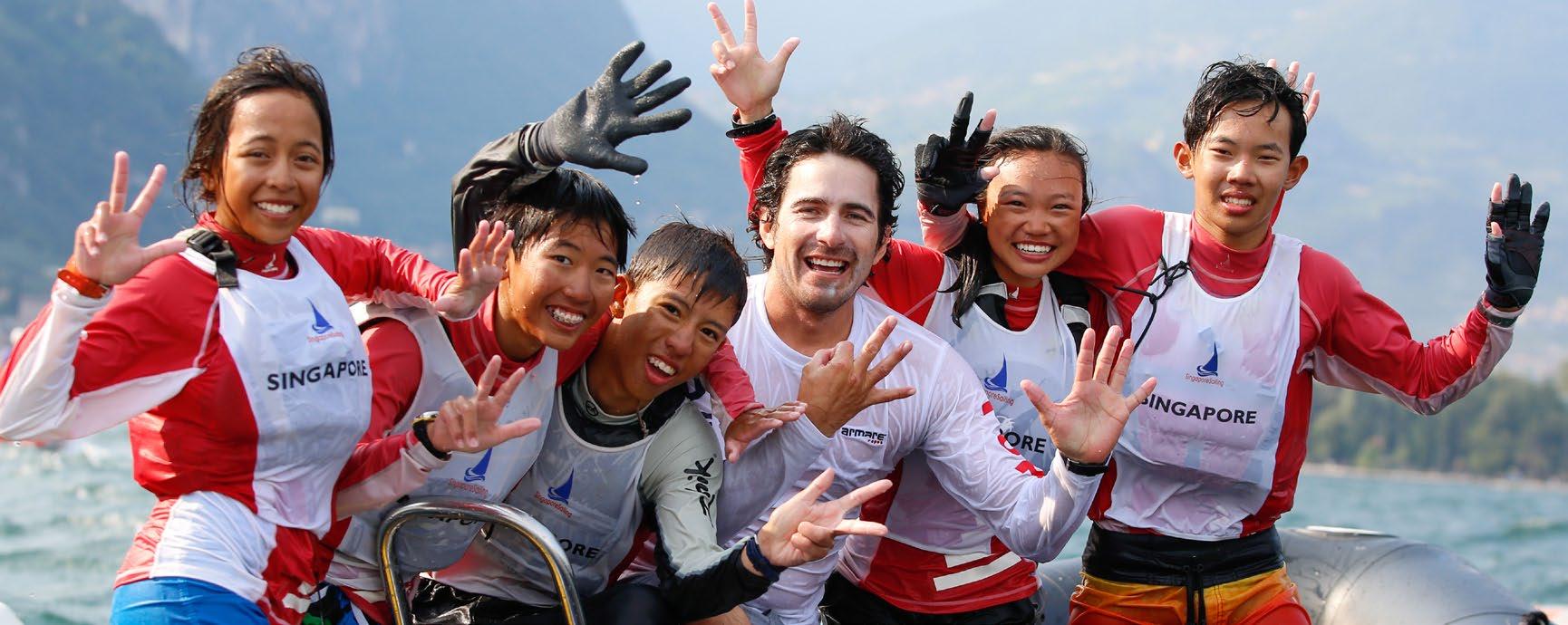


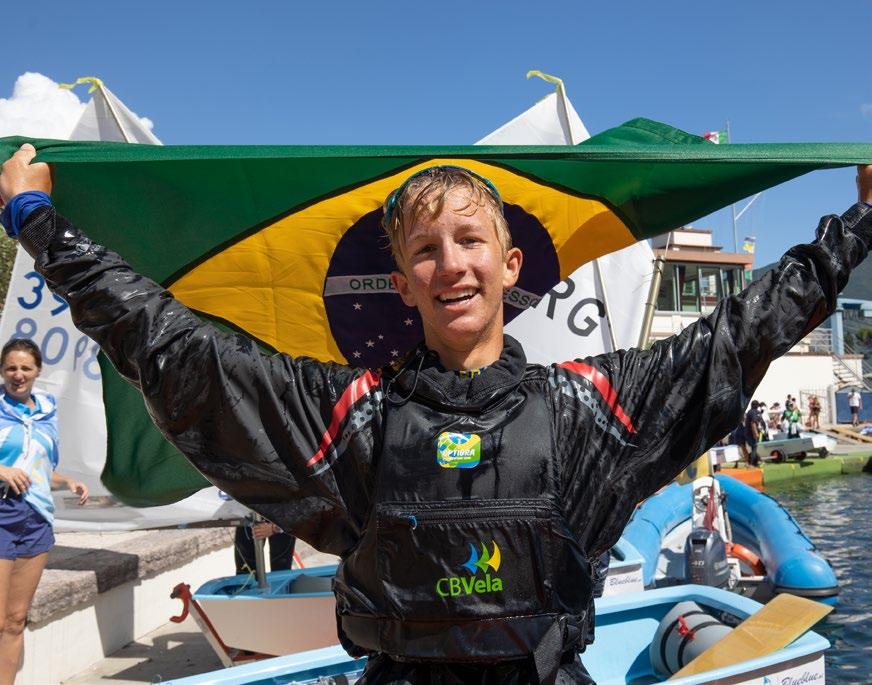
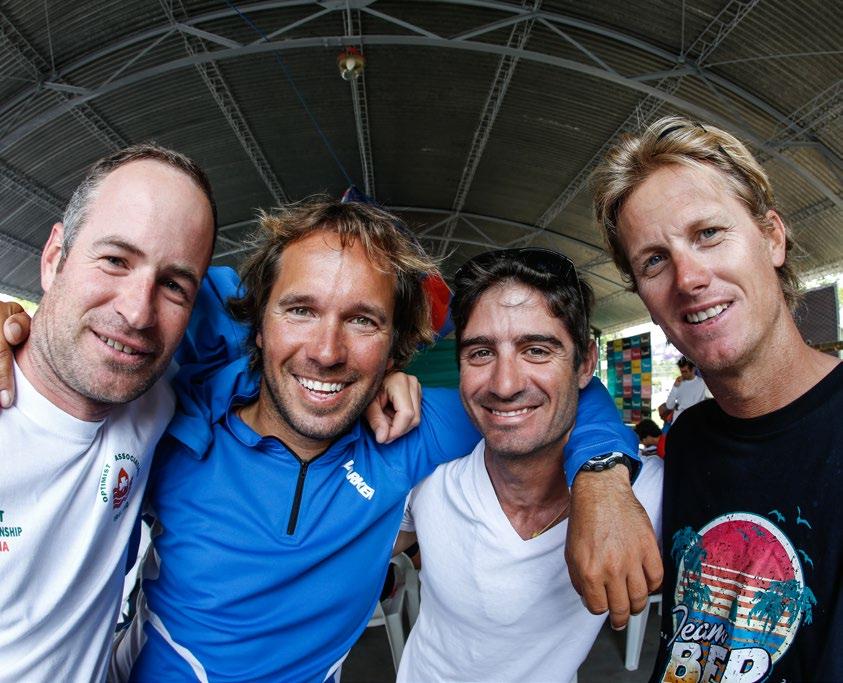








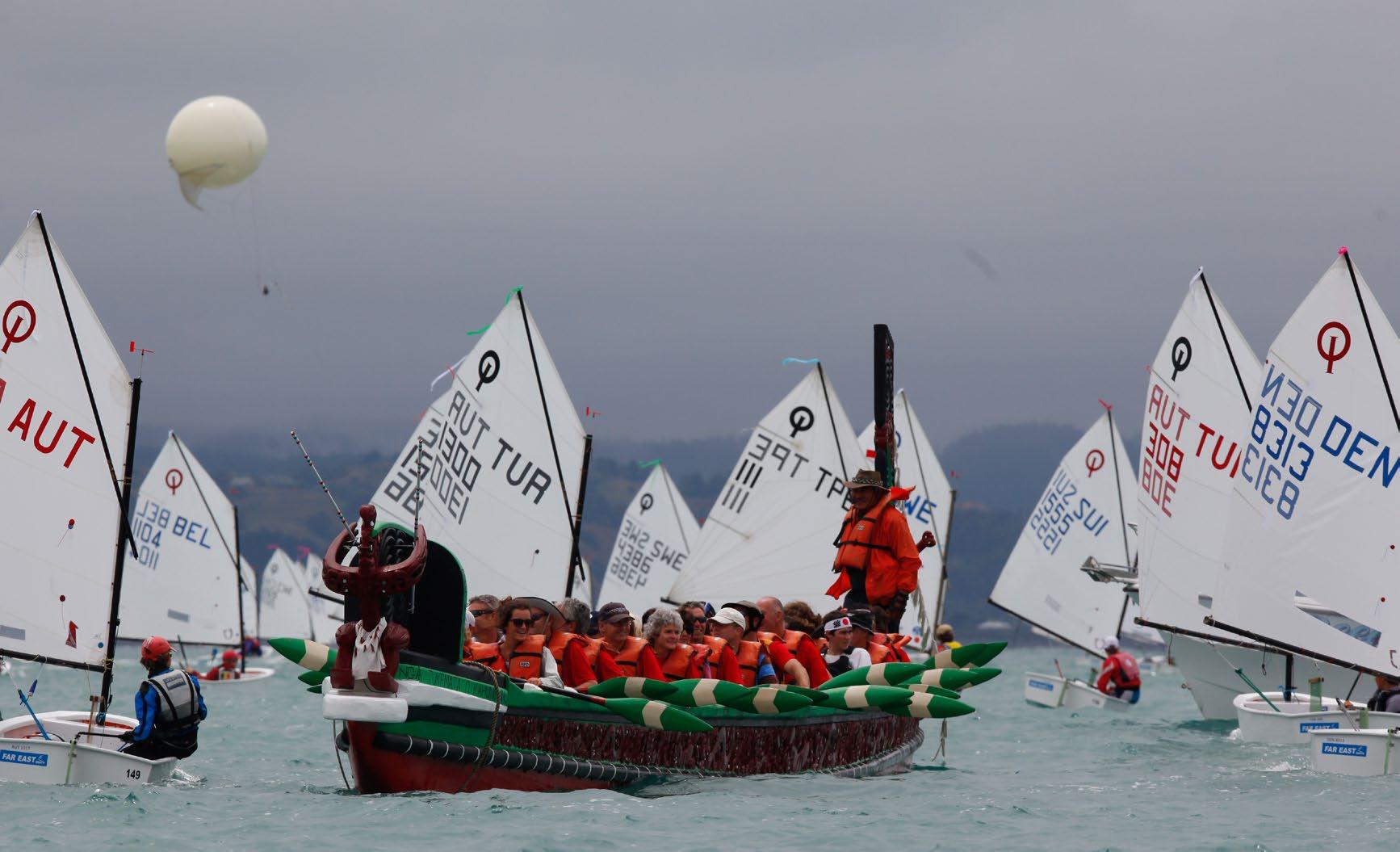
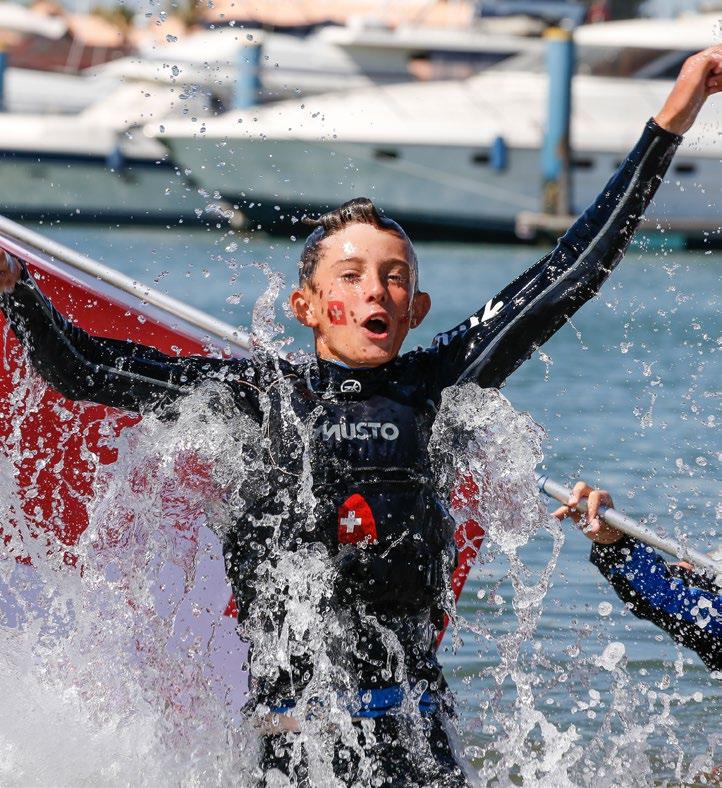



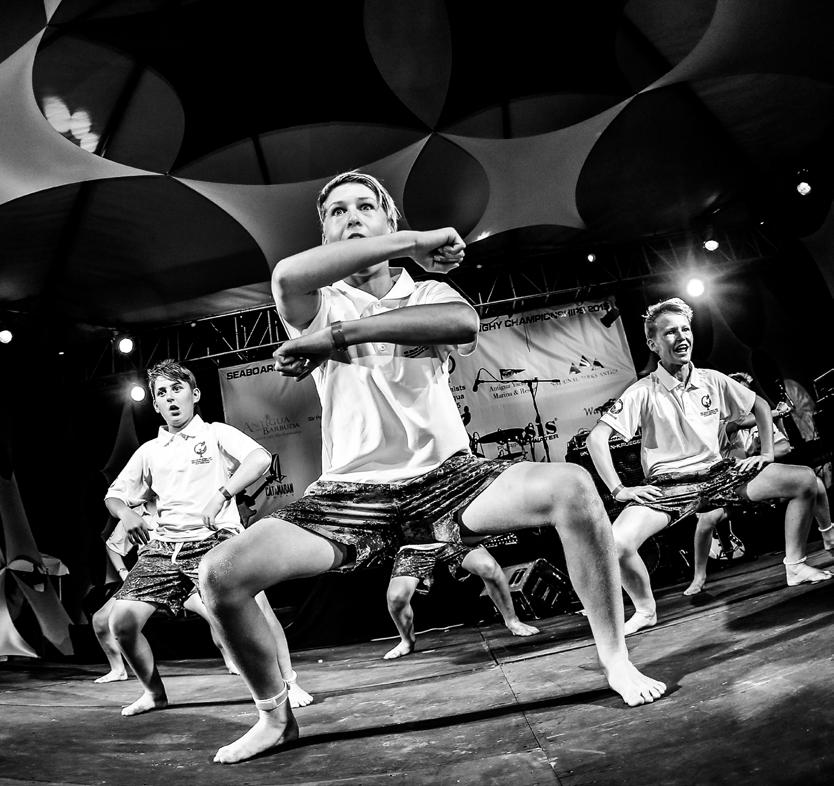



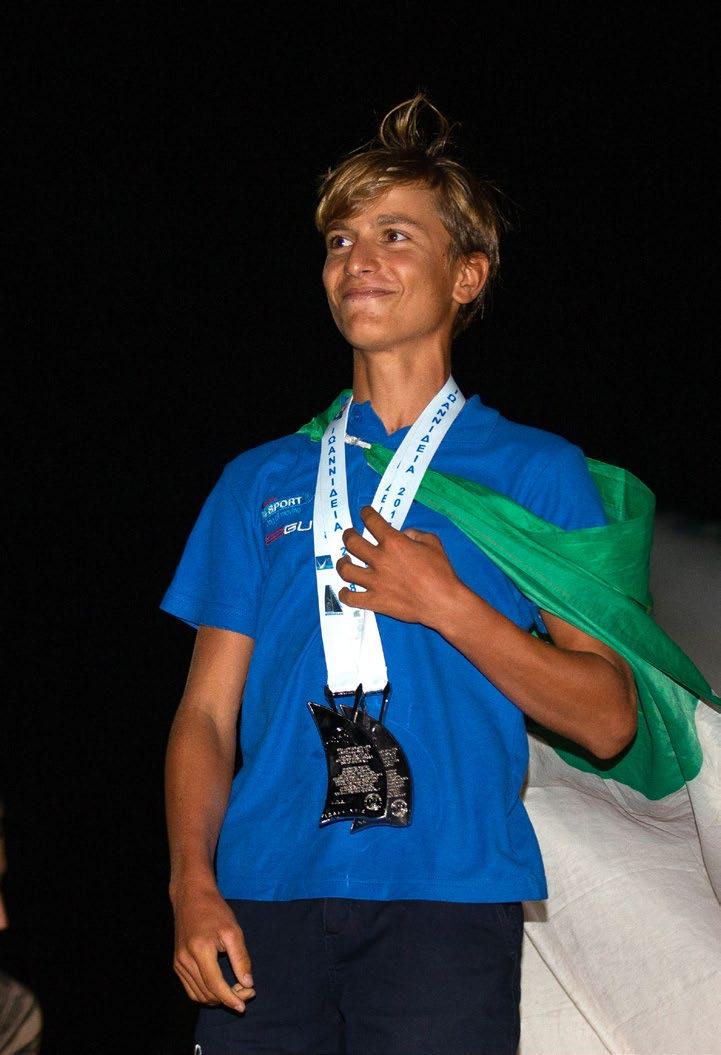



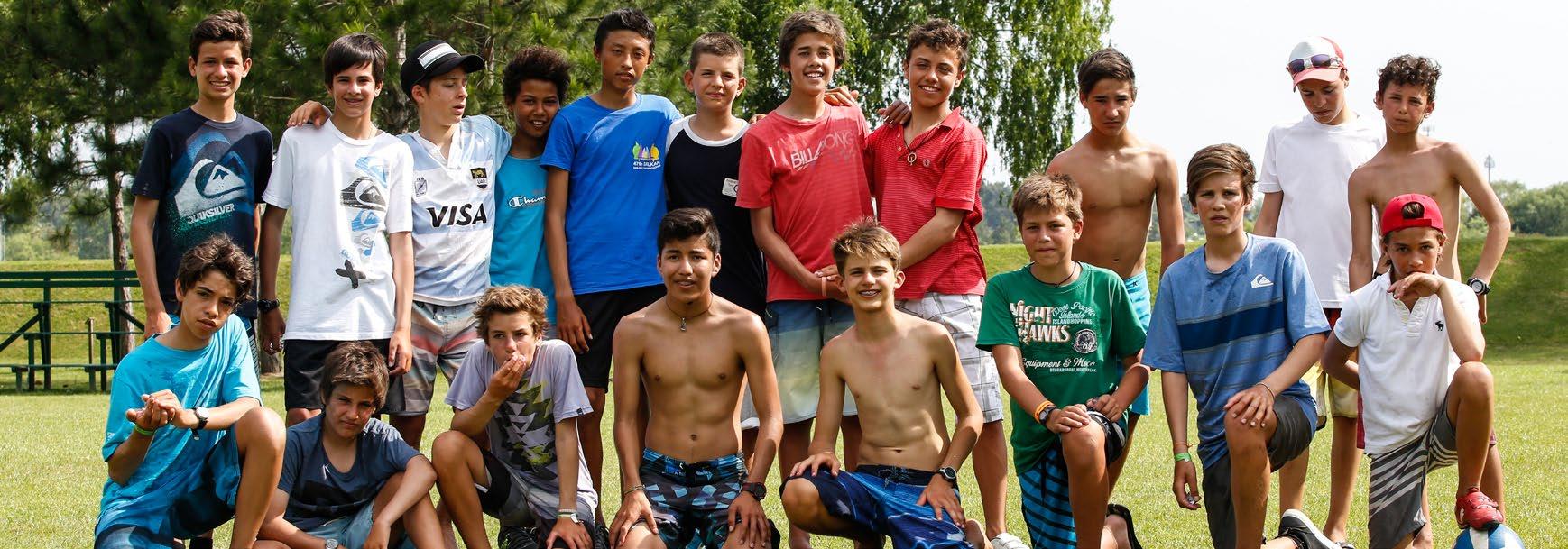








Curiosities of the Atlantic Pearl.

The city was founded on February 10, 1874 (150 years ago) by Patricio Peralta Ramos, but it had a previous history as a salting plant owned by the Portuguese José Coelho de Meyrelles (1850), which Peralta Ramos purchased along with the surrounding lands.

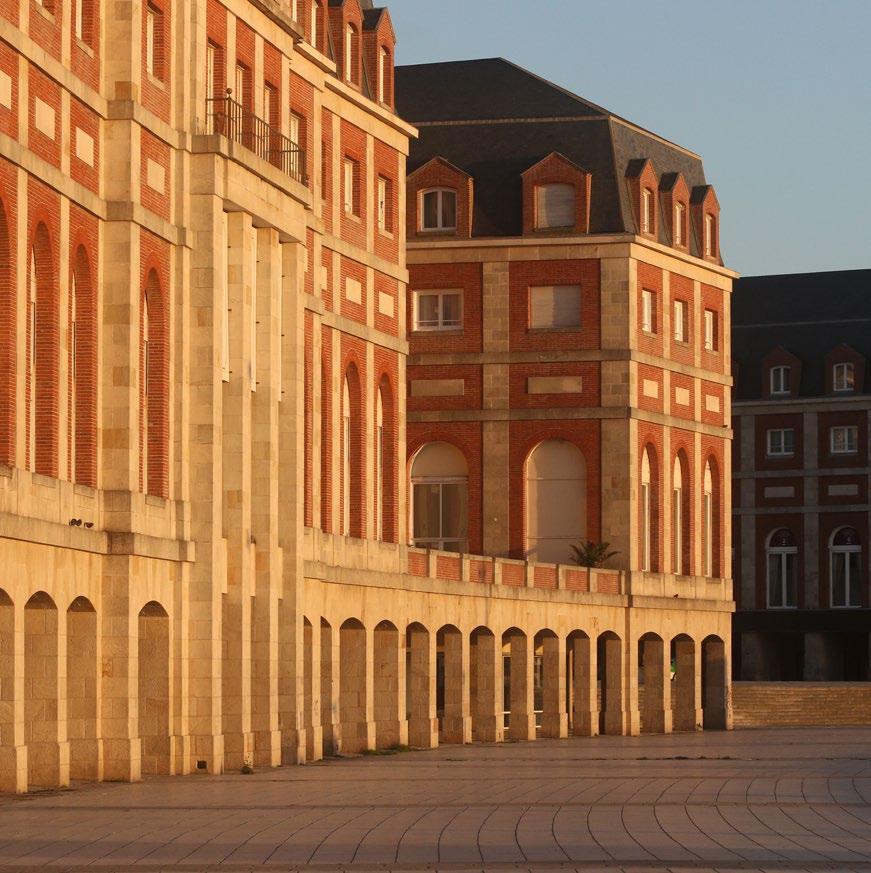
In its early days, Mar del Plata was an exclusive destination, with imposing chalets that earned it the nickname “the Biarritz of South America.
The Mar del Plata boardwalk has evolved throughout its history, undergoing four constructions. From a simple wooden walkway to the impressive work of Architect Bustillo, each one reflected the growth and changes of the city. Fires and storms forced it to be rebuilt several times, resulting in a boardwalk that is now a symbol of the city.
The iconic Mar del Plata golf course was built by the english engineers who constructed the railway in 1896 and later expanded by Juan Dentone.’

The construction of the Mar del Plata port began in 1913 and was inaugurated in 1924. The work was carried out by the French company Sociedad Nacional de Trabajos Públicos, led by the French engineers Allard, Dollfus, Sillard, and Wiriot.

ALDOSIVI is the name of the Mar del Plata biggest football club, recently promoted to the first division. Its colors are green and yellow, and the name is an acronym formed by the first two letters of the surnames of the French engineers who directed the port’s construction company.

The Monument to San Salvador, situated on Mar del Plata’s South Breakwater, is an iconic city symbol and a landmark for fishermen. Despite its name, the figure depicted doesn’t represent a specific saint. Conceived by a priest, its purpose was to unite Mar del Plata’s diverse Italian fishing communities, each venerating their own city’s patron saint, and draws inspiration from Christ.”

Since 1966, the Club Náutico Mar del Plata has hosted the prestigious SEMANA INTERNACIONAL DEL YACHTING (SIY), a renowned sailing championship and festival for dinghy sailors. Held annually in the first or second week of February, the SIY attracts over 900 competitors from Argentina and around the globe.
As one of Argentina’s longest-running nautical events, the SIY often serves as a qualifier for world and continental championships in various classes. Recently, the Argentine Yacht Club joined forces to elevate the event to even greater heights.






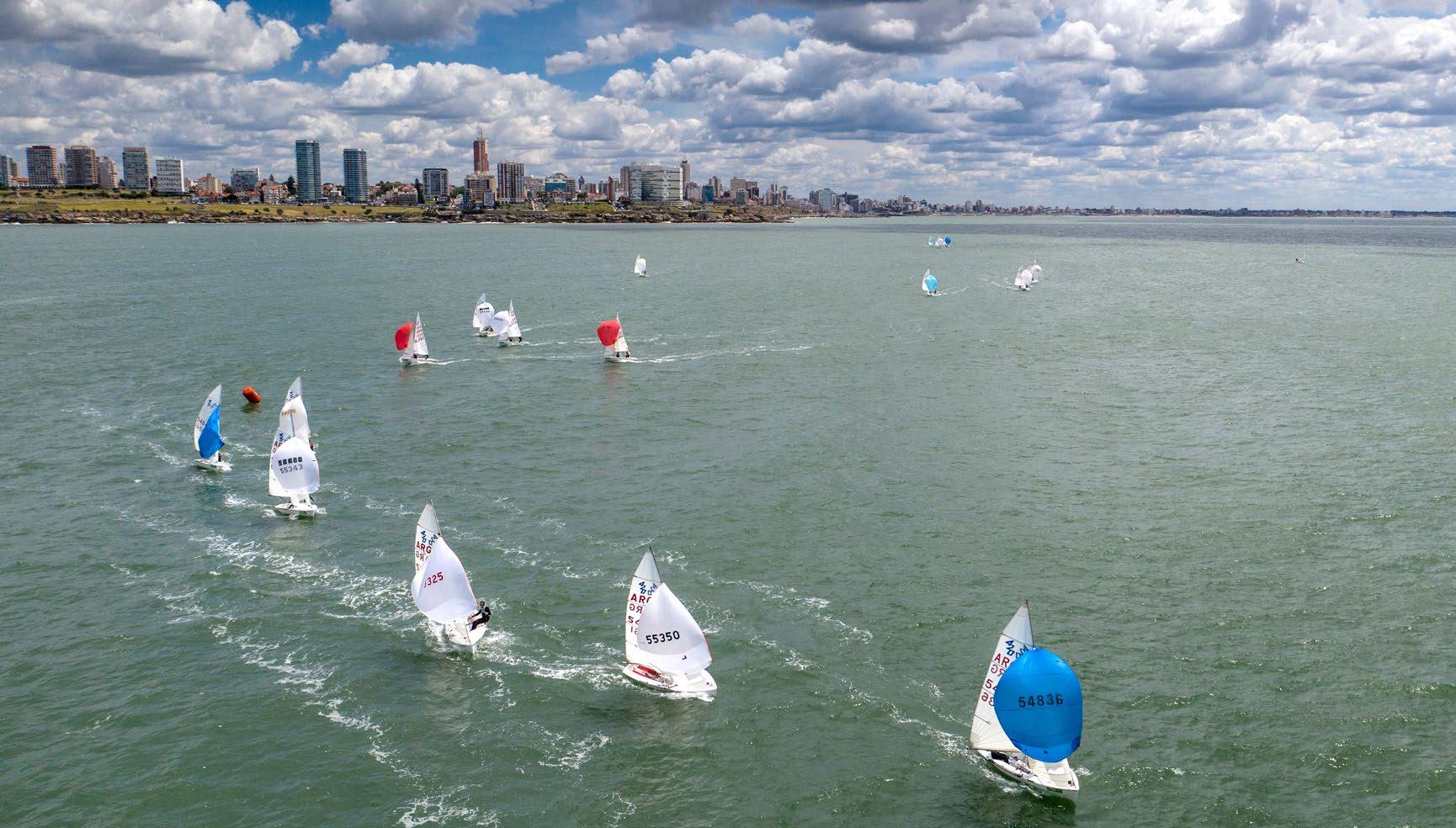
GET READY FOR THE 60TH SIY! THE 60TH EDITION PROMISES TO BE AN UNFORGETTABLE CELEBRATION OF SAILING.







February 3-9
February 14-16
February 22-24 SAVE THE DATES!!
Optimist, ILCA, 29er, and 420 classes. F18, Moth, Waszp, and IQ Foil. Star and Raptor.

Thanks to all the authorities and we extend our heartfelt gratitude to all the volunteers, both members of our club and from other clubs across Buenos Aires and the country, who have made this championship possible.
Sorry for not naming each one of them, but there are really many and they keep joining until the last moment.
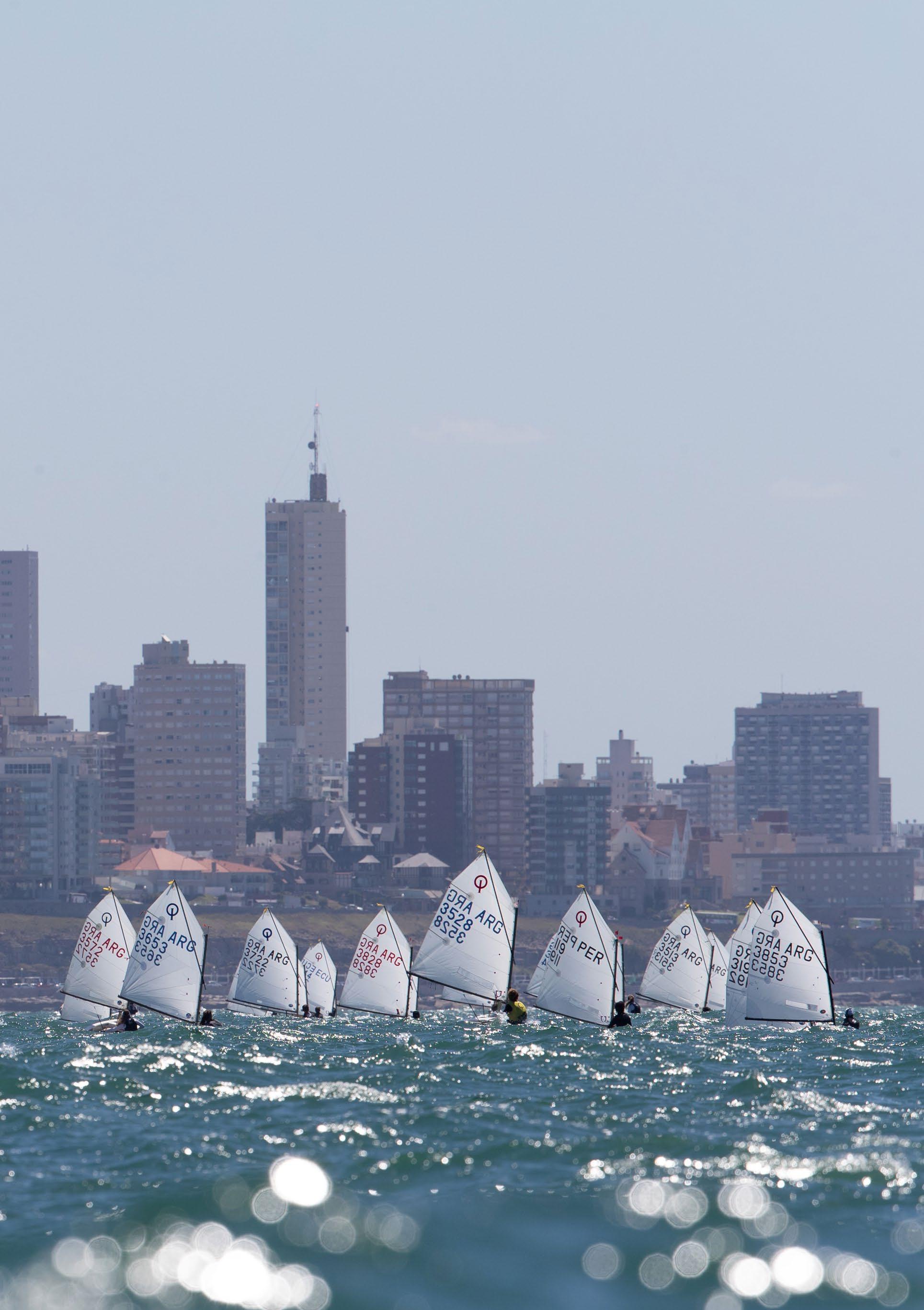
DECEMBER 2024